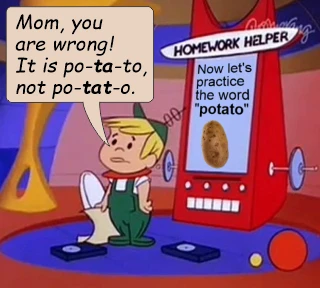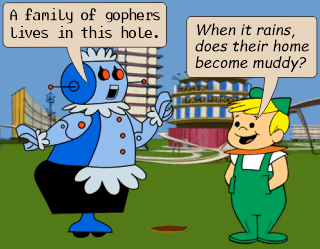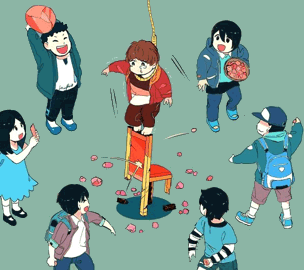We are haphazard jumbles
of animal genes
Years ago I explained that
we need a realistic foundation for our
theories, and now I'll give a new example.
When I was in elementary school, all of us children were given a
hearing test by the school nurse to ensure that we had appropriate
hearing abilities. We sat in a quiet room with headphones
while the nurse would occasionally press a button that played a faint
tone into our headphones, and we were told to raise our hand when we
heard the tone. The tones were at different frequencies and volume
levels.
Since we were young children, the nurse didn't bother to tell us the
results of the tests. Instead, she told our parents. I assumed that my
hearing was perfect, so I was surprised when my
mother told me that the nurse recommended taking me to an ear doctor to
get a more thorough hearing test. I told my mother that my hearing was
fine, but she
follows authority. Fortunately, after
putting me through more intensive testing, the ear doctor decided that
my hearing
is normal.
I think the reason I failed the hearing test is because it was
designed by people who have the attitude that humans are a creation of
a loving God. Those people don't want to believe that humans are monkeys with
genetic defects and idiotic features, and that we cannot
trust our thoughts, eyes, ears, or other senses.
That hearing test produced
faint but nearly pure tones at different frequencies that lasted for a
second or so. The reason I can fail that type of test is that when I am
in a very quiet room, I sometimes occasionally hear a brief but faint
tone.
My assumption is that one of the sensors in my ear is accidentally
triggered, resulting in a very faint tone that fades away after a
second or two.
Perhaps what was happening to me is what happens to people with
tinnitus, except that in my case the tones only occur once in a while,
last for a second or two, and are so faint that I don't notice
them unless I'm in an extremely quiet room.
I have not noticed those tones for so many years that I wonder if
taking thyroid hormones has reduced them, or is it because I have
improved
my diet? Or does that problem slowly disappear with age?
When I was a teenager, I noticed a similar problem with my eyes.
Specifically, when I was extremely relaxed in the chair, and suddenly
got up and began to quickly walk, I would sometimes see tiny
white dots moving around in my field of vision. They would fade
away after a couple of seconds. I assumed that it was the result of my
heart not pumping blood fast enough into my head when I quickly got
out of a chair, thereby causing a brief, low
level of oxygen in my eyes or brain.
The point of this section is that when we design tests to determine
whether a person has a problem with
his hearing, eyesight, sense of smell, or sense of taste, we have to
design the tests for crude, monkey
sensors, not precise scientific instruments.
Our ability to taste and smell is so crude that we cannot
believe anything that our mind tells us about which foods we like
or dislike. For example, this
experiment showed that people were liking and disliking cookies
according to the description of the
cookie.
Another example is that we love the foods that we refer to as " delicacies"
only because they are expensive, which allows us to fantasize
that we are special
people for being able to afford them. To complicate the
issue of foods, a lot of the
foods we like are simply the foods we
are accustomed to.
If a doctor believes that the human mind is a creation of a loving God,
and that our eyes, ears, and other senses are precise scientific
instruments, he would create worthless
tests in order to determine who among us has a problem with our senses.
An extreme example would be a doctor who considered himself and
other people to be suffering from a mysterious brain disorder if they see movement
in this
image.
The people who don't understand that humans have crude and defective brains would assume that
people
who hear
tones, or see lights moving around in their field of vision, are
suffering from mental disorders, hearing problems, or eyesight problems.
By comparison, when we realize that each person is a unique
jumble of imperfect animal characteristics, we would design tests for
our vision, hearing, and intelligence in a very different manner. For
example, we would realize that a hearing test that produces pure but
faint tones for a second or two would be useful for
determining who among us experiences those occasional tones. A better
way of testing a person's hearing might be to play low levels of people
who are talking
to each other. Of course, that test might be useless for the people who
claim to hear voices in their head. Perhaps a
better hearing test would use the sound of growling wolves, or the
voice of a
child.
It is also important for us to realize that humans are not machines that
behave in the exact same manner day after day. The reaction of the
human mind and body can change
slightly from one moment to the next according to how much food we have
eaten,
when we ate, how much exercise we have had, how tired we are,
and the environmental conditions, such as the temperature, altitude,
humidity, odors and allergens in the air, and the comfort of the chair
we
sit on. Therefore, to truly test a person's hearing, vision,
intelligence, physical strength, stamina, and other characteristics, we
would have to conduct the tests more than one time, and when the person
is in different physical conditions and environments.
In a previous document, I wondered whether we need to observe a
person's blood as he does some type of mental or physical
work in order
to determine whether he truly has a problem with thyroid hormones. We
might discover that some people show adequate levels of certain
hormones while they are lounging, but have problems when they start
doing physical or mental work. I also suspect that my thyroid levels
were
somewhat normal in
the morning, but much lower in the evening.
Another interesting thing that I noticed about my body was that when my
tonsils were infected, which used to happen to me every few years, my
body temperature would increase, and although I felt
miserable because of the infection, I seemed to have higher energy
levels
and less trouble with sugar. My assumption was that whatever my body
was doing to raise its temperature was compensating somewhat for
whatever
problems I have with energy production and blood sugar. What exactly
does our body do to raise our temperature? It made me wonder if I would
feel better if I could trick my body into thinking that it was sick and
needed a slight fever.
Humans are
sociable, like monkeys,
not cats
The social animals want to
live in groups, not alone,
like cats and spiders. We have very strong cravings
to have friends and a spouse, to live in close contact with other
people, and to interact with people on a daily basis. We want other people to
admire us and be our friends. We
consider solitary confinement
and loneliness to be a form of
torture. However, no culture yet acknowledges the evidence that humans
are social
animals.
|
What
is the difference between: |
|
a)
Monkeys
relaxing together, or grooming each other.
|
|
b)
Humans
relaxing together, or grooming each other? |
Our prehistoric ancestors
lived in close contact with one another, just
like the monkeys. They would spend the evenings within audio distance
of one another, and they would sleep near each other. The children were
always surrounded by other children and adults, including while they
were sleeping.
Today, however,
almost everybody has the goal of living in a large home on a large
plot
of land, and to provide each child with his own, large
bedroom. This is essentially causing each of us to live in a luxurious,
solitary confinement cell. It gives us the life of a cat, not the
life of a monkey.
Why do we want to own plots of land?
The social animals regard
the land that they live on as belonging to their group, so they chase
away the animals that trespass onto "their" land. Prehistoric
humans would have had the same attitude.
The first group of people to settle into a permanent village probably
considered all of the land as belonging to everybody in their group,
and they probably chased away people who wandered onto "their" land.
However, as the population of their village grew, it eventually had
"strangers", and that might have triggered their emotional craving to
chase away
the "intruders". Since they would not have been able to chase away the
strangers, that emotional craving would irritate them every day, and
that might have been the inspiration to create the concept of a person
owning a plot of land, and marking his boundary with a fence. That
would enable them to satisfy their desire to chase strangers off of
"their" land.
I suspect that the desire for private property and fences became even
more intense when crime began to occur because that would
cause the people to want protection from the criminals.
During the past few centuries, another source of pressure for private
property and boundaries came from the misfits who
want to be secretive about
their deformed bodies and bizarre behavior. Private property allows
them to hide their stolen merchandise, and to get away with pedophilia,
sloppy
living conditions, bizarre treatment of their family members, and
murder
rituals.
Although we may never know for certain why our ancestors developed the
idea of owning land and putting boundaries around it, there are lots of
significant benefits to stopping this practice. For example:
• The city will be much
more beautiful compared to a city that has tens of
thousands of private properties that are surrounded by fences and
walls.
• Each of us will feel as if all of the land in the city is a gigantic
recreational area since we can use all of the land.
• We can maintain the vegetation in
the city with significantly less labor and resources.
The billionaires
are not good role models
The people who become
billionaires tend to own large plots of land, and sometimes entire
islands. They create the impression that human life improves as
we expand our territory and
become more isolated from
other
people, but that is
how cats and spiders live, not "normal"
humans. Rather than mimic them, or admire them, we ought to consider
the possibility that the billionaires are
suffering from some significant
emotional or intellectual disorders.

Humans are social monkeys.
We should design our culture for people who want friends, not people who want servants and isolation.
|
Decades ago
I posted this document in which I
suggested that Bill Gates is retarded, and
I got a response that he is " autistic",
not "retarded".
Regardless of whether we describe Bill Gates and other billionaires as
being on the autism spectrum, manic
depressive, ADHD, bipolar, retarded, or mentally ill, I
do not think that any of them should be our role models or leaders.
The extremely wealthy people are pushing us towards a culture that is
similar
to those in the dystopian
Hollywood movies in which a small group of selfish, aggressive,
anti-social
families rule over a group of slaves, and since they are in constant
fear
of
the slaves rebelling, they live behind large barriers that are
protected by armed and violent guards.
Years ago I assumed that Hollywood was creating those dystopian movies
because the public wanted them, but after I realized the 9/11 attack
was a false flag operation, I began noticing that a lot of the movies
and TV shows that I regarded as idiotic seem to be based on actual events and fantasies of the
people responsible for the 9/11 attack.
An example is the TV show The
Invaders, which seems idiotic until we consider that the
aliens represent the Zionist Jews from Russia. Another example is the
TV episode The Lone Gunmen,
which Christopher Bollyn wrote about here and here.
Today I think that a lot of the Hollywood dystopian governments are
based on
the
fantasies and behavior of the Zionist Jews, pedophiles, and other
criminals that dominate Hollywood, our media, and our governments.
However, they alter the plots so that they
don't incriminate themselves. For example, in the movie The Matrix, they
have machines
creating an artificial world for people, rather than an international
network of Jews
and pedophiles.
Our leaders should
earn their
position by impressing
us
One of the realistic
aspects of the Hollywood dystopian movies is that none of the leaders
in the movies can compete
fairly. They get into leadership positions, and maintain their
positions, through secrecy,
deception, censorship, bribery, murder, inheritances, blackmail,
marriages, divorce settlements, and
other types of cheating.

I don't want
the future to be a group of wealthy criminals and their slaves, do you?
|
That cheating is happening
in all nations. For example, the executives
of Facebook, Google, the ADL, and CNN react to critics and competitors
with
censorship, firings, propaganda, and demands that the police arrest
them for hate crimes.
The dystopian movies, and our nations, are dominated by people who
cannot allow us to have free speech because that would allow us to
expose their incompetence and
lies. Their success comes from cheating,
not talent, so they are terrified of honesty and demand secrecy.
Since there is no right or wrong
way to live, we could
choose to create a world that is similar to the dystopian
movies, but I don't want to
live in that type of a world.
Did you listen to my audio or read the transcript
for Part
4 in which Jordan Dern is speaking to a group of Jews
and asks, " How
do we sustain a hatred and an anger towards the German people?"
Here is the audio of that Jew:
How is the desire of Jews to sustain hatred and anger of Germans any
different
from the government officials in Orwell's 1984 who were trying to
sustain hatred
and anger for Eurasia? What is the difference between:
• Jordan Dern encouraging
hatred of Germans.
• Google executives firing
James Damore.
• Jews arresting people for Holocaust Denial or anti-Semitism.
• Facebook and Twitter executives censoring truthful information.
• The government officials in the
dystopian movies who kill or censor their critics and competitors.
All of those people are cheating
to get what they want because they cannot earn what they want in a fair
manner. They encourage hatred of their critics because they cannot
respond with intelligent reasoning. Our nations have the same type of
disgusting
leaders that we see in the dystopian movies.
We must
become intolerant of
crime networks
In a prehistoric
tribe, the men competed for leadership as individuals, and it was impossible for them to cheat, but
today the world
is a battleground in which organizations,
such as the ADL, political parties, businesses, and churches, are
fighting for
dominance, and there are a tremendous variety of ways for the
organizations to cheat.
It is impossible for an individual
person to defeat an organization,
so organizations will always dominate the competition. Furthermore, the
criminal
organizations have an advantage over honest organizations, so criminals
will tend to dominate all of the unsupervised competitions.
This issue becomes increasingly significant as technology improves. The
crime networks of the future will be more difficult
to defeat because they will have access to increasingly advanced
robots,
software,
drones, lasers, poisons, and equipment to modify bacteria and viruses.
That future technology will make
it easier for criminals to eliminate and manipulate their
competitors.
For example, the future criminals won't have to risk
murdering a competitor with a gun or knife.
They will be able to use drones to infect a
person with a disease or a cancer-causing chemical, or arrange for a
robot to stage an accidental death and then alter its recording of the
incident.
As technology improves, it becomes increasingly ridiculous
for us to tolerate crime. It is also increasingly
ridiculous for us to live in fear of criminals, and to try to protect
ourselves from them. We must change the path that the human race is on
and become intolerant of destructive
behavior.
If a man cannot win a competition fairly,
then he should quietly accept
the failure, not have a tantrum, try to hurt his competitors, or cheat
in the next competition. We
should not ignore or tolerate the people who cheat. People who cheat
are destructive, and they are
becoming increasingly destructive as technology advances.
However, we cannot reduce crime with security devices or punishments.
The only way to
reduce crime is to restrict reproduction to the
people who are willing to earn
what they want, treat people with
respect, and exert self-control over their cravings for status, sex,
material wealth, food, babies, and land.
We should design
our culture for social animals
The free enterprise system
is better suited to cats and spiders than social animals because
it puts us into an
unsupervised battle for our lives. It encourages us to be selfish, and
to regard other people as "opportunities" and enemies rather than as
friends or
team members. It encourages exploitation, deception, hoarding, and
cheating.
The "socialist" cultures, such as Marxism, encourage us to become a
team that works for
the benefit of all people, but those systems are based on an unrealistic fantasy of what a
human is.
The only way we will be successful in improving our world is to design
our culture to fit what we truly are, rather than what we want to
believe we are. For example, we need to
acknowledge the evidence that:
• Humans are a species of animal.
We must design our
government, economy, schools, recreational activities, and other
culture for a group of animals. Furthermore,
we are animals that are no longer adapted to our environment. I've
given some examples of this issue in previous documents, such as
that our arrogance and craving for food is too strong for our modern
era.
This requires us to design
our culture to encourage self-control.
• Each of us is a unique jumble
of genetic characteristics.
Although every human has
the same mental and physical characteristics, we are not identical to one another. No
matter which characteristic we look at, we form a bell graph. There is
not even a dividing line between male and female.
This
requires us to design our culture to deal
with our differences, rather than treat people as if they are
identical copies of one another.
By ignoring the evidence that there are people at the ends of all bell
graphs, the
unusual
people are often ignored, insulted, arrested, misunderstood, or
mistreated, even though some of their unusual characteristics are
acceptable, or even beneficial.
An extreme example of how a person with unusual genetic qualities can
be misunderstood, which in turn can cause problems for themselves
and/or other people, is that Patricia Stallings
was put in jail for poisoning her son with anti-freeze, but eventually
a professor came to the conclusion that her children had a bizarre
genetic defect that caused them to die in a manner that resembles
anti-freeze poisoning. When a person dies in an unusual manner, we
should consider the possibility that he is genetically unusual rather than
assume that he was murdered. Likewise, when we encounter people with
unusual medical problems, behavior, or thinking abilities, we should
consider the possibility that they are genetically unusual.
• Some people are
too defective to function properly.
All cultures ignore
the evidence that everybody has some mental and physical defects, and
that some people's defects are so serious that it interferes with their
ability to enjoy life, follow the rules, do useful work, or fit
into society. Instead, every
culture blames bad behavior, suicide, unemployment, crime, and abnormal
sexual
desires on
some environmental issue that can be fixed with
punishments,
rehabilitation programs, or Bible studies.
• Most people are of average or below-average
intelligence.
Every culture ignores the
obvious fact that the majority
of people
will always
be ordinary
or below-average
in every physical and mental characteristics, and that only a minority
can be "above-average", and even fewer can excel in a characteristic. Most
people cannot
make wise decisions about voting, raising
children, abortion, or any other issue. Therefore, it
is foolish to design a government, economic system, school system, or
recreational activities according to what the majority of people want. Our leaders
should provide guidance to the people, not
pander to them.
• A person needs more than
intelligence to make wise decisions
Every culture assumes that
people who are more intelligent will make the best decisions, but a
person needs more
than intelligence in order to
make wise
decisions.
An intelligent person who has a low level of self-control, a high
level of arrogance, a strong fear of the unknown, mental illness, or an
extreme envy,
will not achieve what he is intellectually
capable of.
He might even choose to become a criminal. When selecting leaders, we
must judge them by more than their schoolwork. We should judge them by
their personality, what they've accomplished in life, their treatment
of other people, and their influence on society.
If we were to design our culture to take into account the issues
mentioned above, we would create significantly
different culture.
Three of the changes that I have mentioned in other documents are:
• We would restrict voting
to a small group of men who have
demonstrated above-average abilities to identify the men with
leadership abilities.
• We would experiment with courtship activities rather than assume that
our animal-like courtship activities are appropriate for our modern
world.
• We would judge organizations by the effect
they have on society. We would
demand that organizations bring benefits
to our lives, rather than titillate
us with useless products or services, such as nail polish for dogs (photo
below).
We must change
our attitude towards happiness
Every culture promotes the
belief that we will improve our life if we have more freedom to "do
what we want to do", but there is no concern
for whether what we want to do is beneficial.
This results in people frequently choosing to do activities that are
useless, dangerous, or wasteful.

This woman painted
her toenails and those of her dog with different colors to celebrate "pride month".
|
For example, businesses are
producing nail polish for both humans and dogs,
but how does
the woman
in the photo to the right benefit from those nail
polishes? How does society
benefit by having businesses develop,
manufacture, and distribute those nail polishes?
We are fools to put time and
effort into teaching chemistry to students if this is all they're going
to do with their education and technical talent.
If there was an excess of intelligent, talented people, then it would
not matter if some of them wasted their time on idiotic projects, but
there are not many talented
chemists, machinists, engineers, technicians, or scientists. We should
not waste our technical talent.
Our animal emotions want us to spend our life entertaining ourselves,
not working,
thinking, or being
concerned about other people. These crude emotional cravings did not
cause trouble for prehistoric people because they were under tremendous
pressure by
nature to put their time and effort into survival.
Today only a few people are needed to provide us with food, housing,
and other items, so the majority of people can spend their day on
something other than survival. Unfortunately, in a free enterprise
system, and in a democracy, our craving to entertain ourselves is
likely to result in us choosing entertainment
activities, rather than beneficial
activities.
Our emotions cause us to believe that the more entertainment we
have, the more happy we will be, but if that were true, then the
welfare recipients would be among the happiest people because they can
spend all day, every day entertaining themselves. In reality, the
people who have nothing useful to do become bored. Boredom is miserable, so we search for
something to do. Unfortunately, we are likely to choose an
activity according to our emotional cravings, and that will cause us
to choose activities that are entertaining.
We would improve our lives by changing our attitudes towards happiness.
Our goal should not be
to have more entertainment, leisure time, freedom, or pampering. We
should
instead
acknowledge the evidence that we get more satisfaction
from life when we " suffer"
by doing work that other people
appreciate,
and especially when we can work with
our friends.
Excessive product variations are wasteful
When Russia was communist,
I sometimes heard Americans boast that one of the wonderful things
about the USA was that our free enterprise system provided us with a
lot more options for home furnishings, clothing, electric razors,
foods, and
other products. However, when we provide ourselves with more options
than we benefit from, we waste our labor and resources, and
we torment ourselves with
unnecessary decisions.

An example that I mentioned
in a previous document is that we have hundreds of
different laundry detergents to choose from, but we need
only a couple different options.
The image to the right is just a sample of some of the laundry
detergents available to American consumers.
The variations of laundry detergent are not merely "unnecessary";
rather,
they are "wasteful". Engineers are wasting
their technical talent on the development of the
variations; businesses
are wasting
labor and
resources by manufacturing the variations; and retail stores must be
larger
to display all of the variations.
The variations also cause us to waste a portion of
our life by requiring us to spend some time trying to decide
which detergent to purchase.
We would have a better life if we reduced the options in all products
to only those that are truly useful. That would allow us to shift some
of our technical talent and
resources to more beneficial projects, and it would reduce the time we
waste.
Options with recreational equipment is
detrimental
Producing unnecessary
options with recreational equipment is just as wasteful of engineering
talent and resources as producing unnecessary variations of laundry
detergent, but the situation is more complex with recreational
equipment.
If people were getting involved with recreational activities to get
exercise, socialize, or enjoy nature, and if they did not care
who won or lost the competitions, then the options for recreational
items would merely be "wasteful".
However, all cultures today are putting tremendous emphasis on winning the
recreational events, and when we provide lots of options for the
recreational equipment, then it encourages people to develop the
detrimental attitude of searching for the best equipment. We could
describe this effect as encouraging the "chase after a rainbow"
attitude. This attitude is detrimental for various reasons, such as:

|
• It encourages us to
become obsessed
with finding the "best"
equipment. This causes us to
waste some of our life searching for "better" equipment, and comparing
what we have to what other people have.
• It can cause us to discard equipment that is in good condition simply
to get a "new and improved"
version.
• The people who arrange for recreational competitions have to waste
some of their time analyzing the "new
and improved" recreational products in order to determine which
of them are acceptable for the competitions.
In a free enterprise system, there is no concern for
whether we benefit from the development of " new and improved" items, but the
Kastron government has the authority to
pass judgment on which items provide us with enough of a benefit to
justify
producing them, and of those items, whether we will benefit by having
engineers continue to do research and development for
them. For example:
• Can we make the game of golf more beneficial
by supporting the research and development of "new and improved" golf
balls, golf
clubs,
sand traps, or grass lawns? Or will we get
more of a benefit if the engineers used their talent for
other projects, such as improving robots, medical equipment, and sewage
treatment plants?
• What are the benefits
to
producing "new and improved" cleats
for the shoes used by people who play
soccer, baseball, golf, or other games? Do the benefits
of cleats outweigh the disadvantage of manufacturing the cleats and the
burden of maintaining the grass that the cleats destroy?
Cleats do not improve our
lives, and it is especially idiotic to waste technical talent on the
development of new and improved cleats. Cleats developed only because
people are given an option for their shoes, and because we have been
fooled into believing that the
purpose of playing the game is to win.
This idiotic culture encourages us to develop obsessions for "better"
shoes, cleats,
soccer balls, golf balls, and other items.
In Kastron, the government cannot authorize the production of an item
unless they can show that it provides benefits that outweigh
its disadvantages. Since nobody can provide evidence that cleats
improve our lives, cleats will be prohibited
for recreational
activities.

This racing
bike is about £60k ($80k).
|
For another example of how
options with equipment encourage absurd obsessions,
consider the bicycles that are used in
the Olympics. The bicycle
in the photo to the right is more expensive than most automobiles, and according
to this
article, another of the bicycles required over 4500 hours of
engineering
time
to develop.
There are thousands of businesses putting thousands
of hours into developing slightly
better bicycle chains, tires, and other components, but how do we
benefit by putting all of
that engineering talent into making a bicycle slightly
faster?
When we give people the option of choosing the bicycle that they use in
a bicycle race, then the contest becomes more than an "athletic" event.
It also becomes an engineering contest in
which the people compete to produce the fastest bicycle. How
does that additional
competition improve the lives of the people involved with racing, or
those who are watching the event?
Likewise, when we give people the option of choosing their golf clubs
and balls, and when the people foolishly believe that the purpose
of the game is to win, then
they are likely to become obsessed with
their equipment. This will result in businesses wasting technical talent and
resources on the development of "better" golf equipment, and the people
who play golf will waste a lot of their time and money searching for
and purchasing the better equipment. They are essentially chasing rainbows.

Imagine a
bicycle racing track in which each lane is whatever material the
athlete chooses for himself.
|
It might be easier to
understand this concept with a more extreme example. Imagine if a
bicycle race required each athlete to remain in his own lane, and each
of them was free to create the path
that he rides on.
This would cause
each contestant to spend a lot of time and money to build the path that
he rides on, and choose tires for his particular path.
The end result would be a bicycle race in which the tracks consist of
different materials, such as asphalt, concrete, wood, linoleum, cotton
fabric, and carbon fiber.
Giving athletes the freedom to choose the material that they ride on would
cause
bicycle races to become
very expensive because it would require each athlete to
develop and build a track. It would also result in businesses hiring
engineers to do research into track materials and tires. Who would
benefit from that option?
There is no benefit to giving
athletes the freedom to choose their track
material, or to develop their own bicycle. Those
options do not
improve a bicycle race, or the lives
of the athletes or
spectators.
We need guidance with recreation, not freedom
Our free enterprise system
and democracy is giving us the recreational activities that we want,
and this is resulting in people wasting their life and resources on
idiotic and worthless competitions, and sometimes dangerous
competitions. We don't need more freedom with recreational activities,
or more pandering by businesses or government officials.
We would benefit much more by having intelligent leaders provide us
with guidance and putting restrictions on our "recreational freedom".
Therefore, the Kastron government will have control of the recreational
activities, and the businesses in Kastron work for the city government.
This allows the
government to determine which
recreational activities are permitted, and which recreational products
are put into production.
For example, the government, not the athletes or
businesses, will decide whether bicycle races are permitted, and if
so, what type of races, and what type of bicycles are available for
racing. My suggestion is that we do not develop
bicycles for racing. If we decide that we want bicycle races, I
suggest requiring the athletes to use ordinary
bicycles that are
produced
for the public. Furthermore, since the
city owns all
of the material items, nobody would be allowed to modify
the bicycle that they use for a race.
The end result would be a bicycle race in which everybody has the same
bicycle. This would prevent the people from becoming obsessed with
whose
bicycle is the fastest. This in turn would force
them to focus on some other aspect of the race, and hopefully they
would choose something more sensible, such as enjoying the competition,
the exercise, or the people.
Recreation should
be beneficial, not to
collect trophies
In our free enterprise
system, engineers will design whatever type of recreational product
will bring some profit, regardless of whether it has any
value to us. In Kastron, the businesses will be in competition to improve life, so the engineers will
analyze the effect their products have
on our lives, and they will look for ways to make their products
more beneficial to us.
In regards to bicycles, instead of trying to make them faster,
they will try to find ways to make bicycles more beneficial to us, such
as experimenting with ways to make them more comfortable, more
attractive, and more reliable so that more people are inspired to use
bicycles to get some exercise or socialize, or simply to get out of
their house and enjoy nature. The engineers will
also want
to reduce the burden of bicycles, so they will want to make the
bicycles easier to produce, maintain, and recycle.

The goal of the engineers
in Kastron is to find ways to
improve our lives, not help us to win competitions.
Since the city owns all of the bicycles, consumers do not have to
afford, store, or maintain them, and this allows the engineers
to design bicycles
that are much higher quality
than would be practical in a free enterprise system.
This will result in bicycles that are extremely expensive, especially
the more complex bicycles, such as those that are designed for
families, as in the photo
to the right.
Although producing high quality recreational products will require a
lot of labor and resources, it is much more efficient to produce a
small number of high-quality bicycles, scuba equipment, kayaks, drones,
and other
recreational equipment that we share,
than to create a large
number of low quality items for each person.
The engineers in Kastron will not be concerned with appeasing consumers
or
investors. Rather, they will appease the government officials who judge
a product according to the effect
it has on
society. Although there is no dividing line between a product that is
"beneficial" and one that is not, an intelligent government will make
better decisions than the public.
With an intelligent government, a bicycle would be considered as a success if it improves our lives in
some manner, such as providing us
with some useful exercise, or inspiring us to get out of our house
and enjoy nature. By comparison, a bicycle would be considered a failure if it causes injuries or
pain, or if it is so ugly or
uncomfortable that nobody wants to ride it, even if it is an extremely
fast bicycle.
The same concept applies to the bicycle paths in the
city. In order for
us to want to ride a bicycle,
we need access to paths that we enjoy, and so the government
department that is responsible for social and recreational activities
will be under pressure to provide bicycle paths that inspire us to use them.
The government officials will not care what type
of bicycle paths the
people want. The government
officials do not pander to the public. Instead, they design bicycle
paths to provide the most benefits and the fewest
disadvantages. For example, some people might want a path to race on,
or to perform dangerous stunts on,
but the government might decide that races and stunts have more
disadvantages than benefits, in which case they would not provide
facilities for such activities.

How do we
benefit from these risky activities?
|
Some people might complain
that the government would be " oppressive"
if
they
prohibited bicycle races and the type of stunts shown in the photo to
the right.
Those people might complain that the government would be restricting
their freedom
to enjoy life,
or denying them their right
to spend their leisure time in whatever manner they please.
However, all governments are already prohibiting a lot of
activities. For example, dueling
and dog fighting
is no longer permitted; base jumping is
illegal; and we are prohibited from racing automobiles and
snowmobiles
on public streets.
The Kastron government will analyze activities according to the
benefits and disadvantages to society. For example, all of the racing
contests that require vehicles
have the disadvantage of requiring a
lot of land and
resources, and they result in a lot more injuries than foot races or
swimming races. Furthermore,
the racetracks make the city look ugly. If the benefit of a race
outweighed the disadvantages, then we could justify it,
but what is the benefit of a
racing contest with vehicles?
Parents do not let children do something simply because the children
insist that they enjoy
doing it, and want
to do it. Likewise, adults in Kastron will not be able
to justify an activity simply by saying they " enjoy it".
If I am correct that the racing contests are worthless or detrimental,
then why are so many people and businesses involved with those
activities? It is because of the combination of businesses that are
looking for ways to make profit, and people who are bored and
looking for something to do. This results in businesses experimenting
with recreational activities.
Unfortunately, businesses are concerned with profit, not improving
human life, and consumers are looking for emotional titillation. Since
we have a natural desire to compete with one another, consumers have a
tendency to choose the competitive activities, regardless of their
value.
Red Bull, Nike, and many other businesses are arranging for a variety
of different racing contests, beauty contests, food eating contests,
weightlifting contests, and chili-eating
contests.
Millions of people
get involved with the activities, or become spectators, simply because
they are bored, want something to do, and enjoy competitions.
The Kastron government is responsible for experimenting
with recreational and social activities, but for the purpose of making
our lives better. Their goal is to provide people
with a variety of activities that are safe, and which have some
benefit. Many of the recreational activities will be competitive, but
the emphasis will not be on winning the
competition, or collecting trophies. It will be something more useful,
such as exercise, enjoying nature, or meeting people.
When the government
authorizes an activity, they must also set the rules
and equipment. For example, if the government
authorizes golf, they might
decide to
create only one type of golf
club, rather than give people the option of selecting from a variety of
drivers,
irons, and putters. They might also require the golf ball to be a
wiffleball or a sponge ball, and to make the golf clubs out of plastic,
in order to
reduce injuries, the land requirements of the game, and the
number of balls that get lost.
By simplifying the game of golf to a few pieces of equipment, and not
giving anybody the option to choose their equipment, none of the people
who play golf will become obsessed with who has the "best" golf
equipment. This in turn would encourage them to
focus on something more important, such as enjoying the people that
they are playing golf with, and enjoying nature. It will also prevent
engineers from wasting their talent and life on worthless projects,
such as "improving" a golf club.
If the adults who currently
play golf, baseball, soccer, or volleyball were told that
all of their equipment options are being taken away, and they must use
the same equipment as everybody else, many of them would probably have
a
temper tantrum. They would insist that they like the game as it is right now,
and that they will not like
the game if it is changed.
However, the Kastron government officials will have the
attitude that people put up resistance to changes simply because we are
animals that have an emotional fear of changes. The Kastron government
officials will not consider
themselves to be tormenting people by forcing them to experiment with
culture.
It is imperative
that we be critical of our desires
A person who does not want
to believe that he is a variation of a monkey will assume that his
desires are sensible, and that whatever he dislikes is truly
unpleasant.
However, when we understand that we have the mental characteristics of
an animal, we will realize
that what we like and dislike is partly
dependent upon what we have become accustomed to, and partly dependent
upon our genetic emotional desires.
Understanding this concept allows us to realize that some of what we like is
actually idiotic, dangerous,
unhealthy, and/or unpleasant, and some of the things we dislike are
actually more enjoyable,
healthier, and/or beneficial.

Some of what
we like and dislike is simply due to what we have become accustomed to.
|
An example that I mentioned
here
is that I provided some Japanese mochi ice cream to some Americans who
love ice cream, but most of them were too frightened to try the mochi,
and those who tried it did not like
it.
The human brain is not a scientific instrument that we can trust. It is
a monkey brain that was designed to survive in a competitive battle for
life. We must be critical of our decisions.
We cannot assume that what we like is good for us, or what we dislike
is bad for us. We cannot assume that what makes us feel safe is truly
safe, or what frightens us is truly dangerous. We cannot even believe
what we see with our eyes, or hear with our ears.
Our prehistoric ancestors evolved for their environment, so they could
follow their emotions, but our emotions have not evolved for our
technically advanced, highly populated world. In order
for us to enjoy our modern era, we need to
look critically at what we like and dislike, and make intelligent
decisions about what we should like
and dislike.
Our brain has the ability to adapt to whatever we repeatedly
do. This allows us to do it without thinking about it. We refer to this
characteristic as "developing a habit" or "getting into a routine". We
need to be aware of this characteristic so that we can occasionally
analyze our habits to make sure they are sensible, and to remain calm
as we experiment with new activities.

Wildebeest
following a migration path.
|
Modern humans need an
understanding of animal behavior. This will help us understand that we
follow our culture for the same reason that wildebeest follow the same
migration path year after year.
We
need to realize that if we try to do something that is different from
what we are accustomed to, such as when an American tries to eat
Japanese food, or when a person tries to play golf with different
equipment and rules, some emotion in our brain reacts by
creating an
unpleasant feeling, just as a wildebeest will become fearful if he
steps off the migration path.
If we believe that our emotions are sensible,
and
if we believe that we should avoid whatever is unpleasant, we
will assume that everything unfamiliar to us is miserable or
dangerous.
However, if we realize that we have a monkey brain, we will realize
that
our fear of the Japanese food and the new variation of golf is simply
due to our emotions trying to warn us to be
cautious because we are about to do something that is different
from what we are accustomed to. That understanding can help us remain
calm as we try the Japanese food or the new type of golf.
Furthermore, we must also understand that our mind is not a computer
that is capable of making instantaneous
changes with our behavior or attitudes. In order for our mind to change
the path that we are following, we must push ourselves
into trying the new path for days,
weeks,
or months.
We cannot expect to determine whether we like a new activity simply by
trying it once or twice. The
more
different it is from what we are
accustomed to, the longer it takes for our mind to relax and determine
whether we like
it.
Our mind could be described as being " sluggish"
with changes, but this characteristic is not a flaw, so
it would be better to describe our mind as being resistant to changes. Animals
evolved this trait because life is very dangerous. It is risky for an
animal to make dramatic changes to its established foods, migration
paths, and other customs. When animals make changes, they do so very
slowly and cautiously.
Some of us discovered this concept when we decided
to reduce sugar consumption and noticed that most foods tasted
bitter or bland for perhaps six months. I
was shocked at how long it
took me to adapt to a low sugar level.
We assume that, because we are intelligent creatures, we can change
courses quickly and easily, but we have an animal's mind that was
designed to follow
established paths, and intelligence cannot circumvent that genetic
design. That characteristic is designed into our brain.
We must push ourselves into trying a new activity for weeks or months
in order to determine whether we truly prefer it. We must repeatedly
remind ourselves that we cannot trust our emotions. An example
that I mentioned here
is that when I decided
to grind beef into burgers, the flavor was so different from regular
ground beef that it was unpleasant,
but I forced myself to eat
them, and after a few weeks I realized that they were far superior to
the
ground beef in the markets.
No society is yet teaching children about these concepts, or
encouraging
adults to exert self-control over their fear of the unfamiliar. As a
result, most people believe that whatever they like and
dislike is truly what is good and bad. This causes those people to make
idiotic decisions about their lives, such as refusing to eat certain
foods or do certain activities because they are certain that those
foods or activities are awful, when they are sometimes merely different from what they are
accustomed to.
We should not assume that our culture is the best it could
possibly be.
Our culture has been developing haphazardly
for millions of years, and
it has been influenced by our idiotic emotions, and by businesses,
religions, Zionist organizations,
lunatics, children, crime networks, and incompetent government
officials.
Our recreational activities, for example, are not the result
of intelligent people who studied human behavior and experimented with
activities. Instead, they are the result of people trying to titillate
themselves, and businesses trying to exploit people for profit.
We should push ourselves into experimenting with our
culture, and helping one another remain calm when we experience the
fear of something different.
We need to push each other into
experimenting
I suggest that the Kastron
schools provide courses to help children understand the concept that we
must push ourselves into experimenting with our culture. This should
reduce the chances that they
become adults who become frightened by proposed changes to their
recreational activities, holiday celebrations, meals,
and other culture.
However, as I mentioned in a previous document about teaching children
about nudity, I don't think we can teach this lesson simply by
providing children with a sequence of words.
I think the children need
to experience it.
Schools should put children into situations where they must break some
of their habits so that the children can experience the emotional
discomfort of trying something different, and the realization that what
they were afraid of is actually harmless or beneficial. I think
children need to experience the concept that some of what they like and
dislike is simply what they
have become accustomed to.
How many cosmetic
options do we need?

This shows
only
40 of the hundreds
of lipstick colors.
|
In a free enterprise
system, businesses compete to titillate us with lipsticks,
hair gels, hair coloring dies, body piercings, perfumes, aftershave
lotions, breast implants, chin implants, and earrings.
There are also businesses involved with trying to undo some of
the cosmetic
options, such as using lasers to remove
tattoos, removing or reducing the size of a breast implant, repairing
earlobes, or undoing the
damage caused by lip injections.
Those products and services require thousands of skilled people to
spend a lot of time and resources on the development, production, and
testing of cosmetic products and surgeries, but what is the benefit? How would we suffer by taking those cosmetic
options away and putting that technical talent and resources into other
projects?
In a free enterprise system, there is no concern for whether we
benefit from a cosmetic option, but the
Kastron
government is responsible for passing judgment on such issues.
For example, they will analyze the benefits and disadvantages to
producing lipstick. Does
producing lipstick bring improvements to our lives that outweigh the
disadvantages? If so, does the improvement increase as we increase the
number of shades? If so, what number of shades brings us the maximum
benefit?
Finally, they must also show that putting engineers, technicians, and
other people into the project is better for society than putting that
talent in the projects that other
people want. How many engineers, technicians, and other technically
skilled people are needed to develop the lipsticks? Are the benefits
of lipstick more beneficial than what those technically talented
people could do if they were working on some other project? Or are the
benefits of lipstick so trivial that we should ignore lipstick until
the more important projects are finished?
They will apply the same type of analysis to hair dyes, perfumes,
earings, and six-pack
implants.
We must understand
the cause of our problems
When determining which
projects to support, the Kastron government needs to consider the cause of the problem the project
is supposed to solve. For example, millions of women are getting breast
implants, but what
problem are the women expecting the implants to solve? How successful
have those implants been at solving that problem? Are there any
alternative solutions that would be more appropriate? Why are so many
women regretting their implants and either removing them or reducing
them in size?
There has not been any serious analysis of why women
want breast implants, but my assumption is that the three primary
reasons
are:
1)
To attract a husband.
Some single women believe
that
larger breasts will help them attract a husband.
2) To mimic role models or peers.
As mentioned earlier, we
have powerful cravings to be accepted members of our group, and to
follow our leaders, but Hollywood celebrities are treated as leaders,
resulting in a lot of women mimicking their breast implants and other
cosmetic options.
3) To get a job.
A small percentage of
women
seem to be getting implants because they want to be a model or a
"celebrity", and they believe they need larger breasts in
order to be hired for those jobs.
Even if a breast implant can help a woman solve one of those three
problems, I think that there are much better solutions. Specifically, experiment with
our culture. For
example:
1)
Attracting a husband.
My
recommendation for Kastron is to arrange for courtship
activities for the single people, starting with the teenagers in
Teentown. I've described this in other
documents so I won't do it again, but I will point out that the
supervisors should educate the
women about men so that the women don't develop the false belief that
men are choosing wives according to the size of their breasts, their
hair color, or
their fingernail polish.
Although it is possible that there are some men who choose a wife
according to the size of her breasts, I think that an analysis of men
would show that the men that we would describe as having "good mental
health" are much more
concerned about a woman's mind.
If men truly preferred women with large breasts, then women would have
evolved large breasts thousands of years ago. The fact that teenage
girls who are in
good physical health, and not overweight, have small breasts
is proof
that
most men don't
want large breasts. Men are most attracted to women who have
breasts that hold
themselves up. I
think that large, saggy breasts are unattractive. I think that if a
woman needs a bra, her breasts are too
large.
The courtship activities should also educate the men. For example, many men assume
that they need hair transplants, a six-pack implant, or a larger penis
in order to attract a woman, but that is not true. However, if women truly
wanted men with hair on their head, then men today would not be bald.
Baldness is more common among European men than Asian men, which is
evidence that Asian women are more concerned about hair than European
women, but there is baldness among the Asian men, so that is proof
that Asian women are willing to tolerate a bald man if he has other
qualities to counteract his baldness.
Men and women
evolved certain physical characteristics according to
what the opposite sex is attracted to. Therefore, our "natural"
physical characteristics are what the opposite sex is attracted to. It
is idiotic for us to assume that a "normal" human body is inappropriate
for attracting a spouse. The only people who will have trouble
attracting a spouse are the people who are truly abnormal.
Another example of this concept is that "normal" women have rounded
stomachs,
and "normal" men have flat stomachs. Some women are making the mistake
of
assuming that men are attracted to flat stomachs, but that is not true. Men prefer women with
curves. If men were attracted to women with flat stomachs, then women
would have evolved flat stomachs.
In a previous document, I suggested that the children in Kastron
occasionally
be exposed to nudity so that the boys don't develop idiotic obsessions
with women's sexual organs. Although we will not know for sure until we
find the courage to try such an experiment, I think it will
significantly reduce the concern about breast size.
2) Mimicking role models.
Our nations today allow
organizations to promote role models, such as the Kardashian women and
Lady Gaga. These role models are encouraging breast implants, Brazilian
Butt Lifts, lip injections, Botox injections, and multiple earrings.
However, the Kastron Quality Control Department has the authority to
pass judgment on people in influential positions, and remove those who
have a detrimental effect on society.
By providing young girls with more appropriate role models, we will
dramatically decrease their cravings for cosmetic surgeries.
3) Getting jobs.
In a free enterprise
system, women with larger breasts have an easier time getting certain
jobs because many businesses are using their female employees to
attract male customers. In Kastron, the businesses work for the
government, and the businesses are in competition to improve our lives.
Therefore, the quality control department will be able to replace the executives who use women
as sex toys, and that would be a better solution to the problem.
Are you willing to test your
leadership abilities?
The Kastron government will
be in control of the city's culture, economy, and school system, and
the voters will be responsible
for passing judgment on which of the government officials are providing
us with sensible guidance, and which of them needs to be replaced. None
of those jobs is easy.
Creating a new city and supervising it requires finding people for
those jobs, but nobody
has had experience with such jobs. Therefore, we need people to
volunteer for those jobs.
Are you
willing to try those jobs and test your abilities? If so, are you
willing to voluntarily try another job if we don't like your decisions?
Or will you put up a fight and accuse us of not recognizing your
amazing talent?
Can you notice obsessions?
Even if you do not have the
desire or
talent to be a top government official, or to provide guidance
about engineering or scientific
issues, you would be useful if you are capable of identifying some of
the obsessions that interfere
with
the design of products, software, recreational activities, and other
culture.
Animals evolved the characteristic of becoming obsessed with
their goals so that they don't give up easily when searching for food
or taking care of their children. They will do whatever it
takes to achieve their goals. They will not give up.
Humans inherited that characteristic, and it was valuable for
prehistoric people because they became obsessed with sensible goals,
such as finding food, taking care of their children, and defending
themselves from wolves.
The situation is dramatically different in our modern era because we
have lots of leisure time, and we have businesses, sports
organizations, religions, nonprofit groups, and lunatics influencing
our activities and desires. Since we have a strong resistance to
thinking
and looking critically at ourselves, the end result is that lots of men
become obsessed with useless, idiotic, wasteful, and dangerous
activities,
such as setting a world record for pole sitting ( video
here),
or owning the largest yacht.
Although some people develop obsessions that provide us with a few
seconds of entertainment, such as
the people competing to create the world's largest rotating ice donut,
it would be better if our culture did not encourage
idiotic
obsessions.
Our obsessions can also interfere with the development of products and
software. For example, years ago somebody came up with the idea of
swiping a touchscreen to provide input to the software. Although the
concept of swiping a touchscreen is beneficial, I think the modern
smart phone is an example of people who became
so obsessed with the concept that they used it excessively. I
think the phones would be easier to use if some of the swiping was
replaced with menus. I also suggest replacing some of the icons with
words or menus, or adding words under the icons.
The swiping and icons in our "smart" phones is so extreme that it
reminds me of when I was a child and I sometimes became so excited to
learn a new word that I would look for
an opportunity to use it.
Finding an improvement to a material item, social activity,
recreational
activity, or software program requires more than
intelligence and talent. It also requires the ability to look
critically at our brilliant ideas, and using self-control to prevent
our crude, monkey emotions from interfering with our decisions.
Even if you do not have the desire or talent to be a top government
official, engineer, or scientist, you might have the talent to notice
confusing and awkward aspects of our material items, recreational
activities, software, bicycle paths, or other culture.
When should people be allowed to do worthless activities?
The issue of whether smart
phone designers are obsessed with swiping brings up an important
issue that has no right or wrong.
Specifically, when should the government allow people to do
something
that is inefficient or worthless simply because they enjoy it, rather
than force the
people to be efficient and sensible? For example, if people enjoy swiping their phones, should
the
government let them do it even if it is wasting their time and causing
them some confusion?
A jigsaw puzzle might be a better way to explain this concept. A jigsaw
puzzle can require a person to spend hours
trying to solve it. Should the government require
jigsaw puzzles to be easier to solve so
that people don't waste so much of
their time?
When is it acceptable for people to
get involved with an activity that is wasteful and worthless, but which
they find entertaining? Should the lonely or bored people be allowed to
waste their time trying
to solve a
Rubik's cube or crossword puzzle? Or should
we prohibit people from wasting their time?
Are the businesses that produce crossword puzzles, Rubiks cubes, and
similar products improving life for us? Or are they causing people to
waste their life on a worthless activity?
There is no correct answer to such questions. The government officials
must make decisions, and the voters must pass judgment on which of the
officials are making wise decisions.
All recreational activities could be described as "idiotic", but some
activities have a benefit, such as providing
exercise, or helping us to
socialize, but what benefit do jigsaw puzzles provide? If people got
together in a
group to solve jigsaw puzzles, then we could describe it as a "social
activity", but most people are doing jigsaw puzzles in their home and
by themselves, which makes the jigsaw puzzle just a method for lonely people to distract
themselves from their misery
and prevent boredom, similar to
playing the game of solitaire, or playing with a pet dog.
The Kastron government will have a department that manages social and
recreational activities, and it will be responsible for finding
improvements to our activities. The citizens of Kastron will also be
encouraged to look for ways of improving social and recreational
activities. Our goal should be to create a life that we enjoy
reminiscing about when we get older. We should want to sing a variation
of Armstrong's song, but how many elderly people want to sing
this variation:
I solved jigsaw puzzles, and crosswords too,
enjoyed solitaire, and the Rubik's Cube.
Had a pet dog that was such a good friend,
that we slept together in the same bed.
And I think to myself, what a
wonderful world!
The Kastron government will discourage
people from doing things simply
to distract themselves from their
loneliness and/or boredom, and encourage
people to
look for activities that are
at least somewhat beneficial. With that attitude, somebody might be
inspired to think about how
to make jigsaw puzzles more beneficial, and he might propose that
instead of
making
them from paper, the city should arrange for the arts and crafts clubs
to make the pieces from ceramics, wood, and colored and iridescent
glass.
Instead of tearing the jigsaw puzzles apart when finished,
they would become " jigsaw mosaics"
for the city. They would be used
to decorate the foot paths, plazas,
restaurants, offices, bicycle paths, factories, and train stations.
|
Instead
of making jigsaw puzzles out of paper, and then breaking
them apart when finished, why not make them from rocks, tiles, and
glass? |
|
The
"jigsaw mosaics" could be used for decorations
in our homes, plazas, foot paths,
restaurants, social clubs, and schools. |
That modification to jigsaw
puzzles causes them to become beautiful
works of art for the city, rather than a waste
of life. As the years passed, the city would become increasingly
beautiful as a result of the accumulation of those jigsaw mosaics.
Furthermore, the people who produce those jigsaw mosaics would get more
satisfaction from creating them because
other people would appreciate their work, including the future
generations.
The adults who are alive today are accustomed to making jigsaw
puzzles using pieces of paperboard,
so they might have a tantrum if their government
announced that paper jigsaw puzzles are discontinued, and that they
must either produce "mosaic jigsaws"
for the city, or find some other hobby.
However, if children grow up in a social environment in which the
adults are creating mosaic jigsaws for the city, they would become
adults who regard that as a sensible and useful hobby, and they would
likely consider the paper jigsaw puzzles to be one of many examples
of the thousands of worthless
activities of a free
enterprise system and a democracy.
We should put historical information
into a database
In previous files, such as this, I suggested that
the Kastron government maintain a database about people's lives,
warning signs, and the animals and plants in the city. I also suggest
that the database contained information about the city's culture. This
would provide historical information about the
city for
future generations.
For example, after a group of people build a footbridge for the city,
the footbridge could have an entry in the city's database to show who
built it, when, and/or why. When somebody develops an improved version
of
a baseball game, the database could explain who devised it, when,
and/or why. When a group of people create a stained-glass window for a
factory, the database could show who created it and when. The database
could also have photos and video.
In addition to helping the future generations understand how their city
and culture became what it is, it would also be entertaining. For
example, it
would allow a person to discover that one of his distant ancestors
created some of the decorative mosaic jigsaws on one of the foot paths
that he
enjoys walking on, or developed the variation of baseball that he
plays, or conceived of the city festival that he enjoys every summer.

A drive-in
restaurant in 1957 that provided cool air to
the people in the car. (Click
for the full size.)
|
There are lots of
individual citizens creating Internet sites that have historical
information, such as shorpy.com, which collects old photos, such as the
photo to
the right, but it would be better if the field of history were to be
treated as a real
science, and
historians had the same serious attitude as biologists and zoologists.
Historians should gather information about how our culture
developed. In addition to being interesting, that knowledge can help us
decide what aspects of our culture should be modernized.
Historians could also help us understand our language. For
example, should we continue to use the word " bespoke"?
How did that word become a part of the English language? Is it
necessary today?
Dictionaries have some information about the history of some words, but
that should be the job of historians
because understanding our language is equivalent to a zoologist who is
studying the chirping of birds, or the facial expressions of monkeys.
The authors of dictionaries should get information about language from
the historians.
We should
standardize on one language
Many French people boast
that their language has the most pleasant sounds, but
the French language has a lot of the same irritating sounds as
other languages, such as the words that resemble a person who is
clearing his throat or spitting, and words with "sharp" sounds.
The pride that we feel for our language is due to our animal emotions,
not because any of us are speaking a language that is truly impressive.
Our emotions cause us to be defensive of our possessions, but we should
not regard language as one of our possessions. We should regard
language as a communication
tool.
We should exert enough self-control to acknowledge the evidence that
all languages are an irrational and confusing collection of
monkey noises that have been accumulating and changing haphazardly for
millions of years. All languages need
to be overhauled, but that is a very complex job. We don't yet know
enough about language to properly overhaul a language, and we have much
higher priorities right now, anyway.
We do not cause trouble when we allow our neighbors and employees to
have different hairstyles or recreational activities, but it is
detrimental to allow people to speak different languages, especially
when they are living in the same city.
Language should be regarded as a tool, similar to how we regard math and numbers.
We would not
benefit by giving people the freedom to use
different bases. For example, we would not benefit if some people were
using base
8, others were using base 10, and others were using base 9. Likewise,
language should not
be a freedom.
It should be a tool.
The USA is already causing trouble for itself by giving Americans the
freedom to choose between the imperial and
metric system. We also have the freedom to mix the two systems together
on the same engineering diagrams and products. We would cause ourselves
even more trouble if we allowed people to have the freedom to use
whatever bases they please, and to mix the bases on the same
engineering diagrams.
It did not matter that the prehistoric tribes in China were speaking a
different language than the prehistoric tribes in Europe or Africa
because the tribes were isolated from one another. Today, however,
every
society is interacting with the
others.
The human race has essentially become a "planetary society" because we
directly and indirectly influence the lives of one another. We need to
stop behaving like independent, arrogant, prehistoric tribes. We need
to change our attitude and
behave like a large group of people who are sharing the planet and
working together for the benefit of all of us.
If a human language was so simple that we could learn one within a
week, then we could tolerate different languages, but our languages are
extremely difficult to learn, especially the primitive
languages, such as Chinese.
Furthermore, our languages are more difficult to learn than they
need to be because all of them are crude,
such as having irrational
verbs, or words that don't spell the way they sound, or words with
multiple meanings.
Children are putting a tremendous amount of time and effort into
learning a second or third language, but they are wasting their
time and memory. Children would benefit much more if they put their
time and
effort into learning
something that is truly useful, such as science, human behavior, or
the history of human culture.
Furthermore, all of the technical talent that is put into developing translation
software is a waste. We should put that talent into
creating
software that is more beneficial. The software engineers who are
creating "Unicode" software are
also wasting their time, and they are encouraging the use of primitive
languages rather than putting
pressure on people to use a more advanced language.
Likewise, all of the people who make a living by translating documents
are wasting their life on a worthless activity. Those people require a
lot of food, electricity, and other resources, but they give us nothing
of value in return. They are as worthless as a group of people who
spend their time translating between metric and imperial units.
If the computer programmers who have been wasting their talent during
the past few decades on dealing with different languages and Unicode
had been putting their talent to improving software for robots, we
might today have a lot of very useful robots.
For example, now that we live to about 80 years of age, a large
percentage of people will need artificial hips and knees, including
some computer programmers, but our current technology and surgical
techniques are crude. If the
computer programming talent had been put into surgical robots, we might
by now, or very soon, have robots that can use very small and delicate
tools to replace joints or cartilage without
destroying all of the tendons and
ligaments, thereby providing us with much greater mobility, and
preventing the problem of artificial hips popping out of their socket.
Or, if the computer programming talent had been put into creating CNC
bulldozers and other earthmoving machines, we might by now, or very
soon, be able to draw canals and building foundations on a computer,
and have the CNC earthmoving equipment create them for us without any
people, just like a 3D printer and a CNC milling machine.
Or perhaps the computer programmers could have created software that
will combine the
data from CT scans, MRI scans, and/or ultrasound scans in order to
produce 3D models of our body with more detail, and which allows us to
remove skin, bones, or organs so that we can get a better understanding
of the person's body.
We are causing trouble for ourselves by giving nations the
freedom to speak whatever language they please. This is a freedom that nobody needs or benefits
from. Unfortunately, no society yet cares
whether
children are learning something useful, or whether the computer
programmers or other people are doing
beneficial work.
Humans do not enjoy learning, so it is absurd to push children into
learning additional
human languages. The only people who should learn additional
languages are those who are interested in analyzing history.
We should
standardize on one pronunciation
Since almost everybody of
importance already speaks English, it would be easy to make English the
standard language of the world. Although English is full of irrational
characteristics, so are all of the other languages. Let the future
generations deal with that problem.
Although English is spoken all around the world, different people have
different accents. Some people consider the different accents
to be entertaining, and businesses in the USA sometimes use
narrators who have one of the British accents in order to appear
intelligent. However, we should stop considering accents to be
entertaining, and we should especially stop the practice of trying to
deceive people with accents. We should use language for communication, not to entertain or
exploit one another.

The people
who enjoy accents, slang, and baby talk should do
it at
their home, not in public.
|
If some people want to
entertain themselves with
different accents, they can do so with their friends during their
leisure time. They can even speak "baby talk" with one another.
When we are alone or with
our friends, we can have lots of freedom,
but when we are "in society" we are a member of a team, and we should
lose our freedom to behave in an irrational and idiotic manner, and we
should be required to behave in a manner
that is beneficial for the team.
When we are "in society", we should speak the same language, and with
the
same accent, as everybody else so that we don't interfere with
communication, or cause
children to pick up inappropriate pronunciations, words, or expressions.
Adults often giggle when children mispronounce words, or use words
incorrectly. Although there is nothing wrong with being entertained by
the mistakes of a child, we should let the child know that he is making
a mistake. If we
don't counteract our giggling, the child may deliberately abuse
language again and again, in order to become the center of attention.
All of us occasionally make a mistake in the words we choose, or the
pronunciation of a word, but we should react to those mistakes in the
same manner that we react to a person who makes a mistake about how to
use a knife, bicycle, or computer. Specifically, we should counteract
our giggling by pointing out to them that they made a mistake.
Otherwise we encourage people to mimic the mistake.
An example of how doing nothing to correct mistakes can ruin a language
are the adjectives that Americans are using to describe something that
they like. Some of the adjectives that I have heard are:
hot, cold, cool, groovy, dope, wicked, sick,
to die for, trick, the bomb, hardcore, unreal, nasty, rad,
sweet, crazy, kickass, boss, and gnarly.
Many people deliberately use words in weird manners simply to become
the center of attention. However, we should tell people that if they
want to become
the center of attention, they should do something impressive rather
than make the mistakes of a child. We should consider the people who
deliberately abuse words in order to become the center of attention as cheating in
order to get attention.
How do we ensure
everyone speaks the same version of English?
Although millions of people
around the world can speak English, some people have such strong
accents that I have trouble understanding them. The
children who grow
up around those people pick up their accents, perpetuating
this problem from one generation to the next. There are also some
subtle differences in the words of British English and American English.
How can we standardize the English accent? How do we ensure that all
children are using words in the same manner? How do we stop
people from picking up idiotic
expressions, such as starting sentences with "That
being said", "If you think about it", and "If
you ask me"?

One possibility is to
provide young children with a rugged version of an e-reader, but
develop software for it that can read
books to children, listen to
the children read, and teach them pronunciation,
arithmetic, and other lessons.
This would allow the computers to dampen slang expressions, and to
correct children when they
say ki-lom-eter rather
than kilo-meter.
Parents would operate the e-reader for children who are too young to do
it. The parents could either read the stories to their children, or
they could let the computer read the story. If the parents decided to
read the story, then the computer would correct the parents if they
mispronounced a word.
When the children read the story, the computer would correct their
mispronunciations. This would enable children around the world to learn
the exact same pronunciations, spellings, words, and definitions.
We should develop
robots for teaching
Although some children
might not like learning from a computer, life is becoming
increasingly complex, and that makes it increasingly difficult for
parents and human teachers to handle the chore of teaching children all
of the information that they need today.
Parents enjoy teaching their children how to do things, such as tie
their shoelaces and ride a bicycle, and parents also enjoy taking their
children to a park to teach them about the plants, creeks, and animals,
but parents want to
take the role of a teacher only
when they are in the mood to do so, which is seldom, and
only for brief periods of
time, such as an hour.
We inherited an emotional desire to play with
children, not become full-time
teachers
who provide them with useful skills and help them to get a modern job.
Parents want to pamper their
children and listen to them giggle,
not take the role of a drill sargent who pushes them into learning
useful skills.
It was acceptable for prehistoric parents to play with their children
because their children picked up everything they
needed to know simply by observing the adults. However, as society
becomes more complex, the children need more preparation for adulthood.
Furthermore, as soon as we begin restricting reproduction, the children
will become increasingly intelligent, curious, and interested in
learning, thereby causing them to ask
more
questions. The children are also likely to become more adventurous, thereby requiring more
supervision.

As our world becomes more
complex, parents need assistance in preparing children for our modern
world.
We need to develop robots and computers to assist both parents and
teachers.
As of 2022, our robots are not very mobile, but eventually robots will
have such
functional arms and legs that they will be able to show children how to
do things, such as
ride a bicycle or use a smart phone.
The robots could also take children on
trips
around the city to show them
factories, animals, ponds, and forests. The robots could also help with
the supervision of children at recreational areas.
Computers could
also help adults use
language more accurately
We already have computer
software that listens to us and responds to us, such
as Alexa, but that software does not make any attempt to correct our
mistakes with pronunciation, grammar, history, or logic. Businesses
in a
free enterprise system will not create
software that
criticizes or educates us because consumers want entertainment, not
constructive criticism or an education.
Furthermore, the pedophiles, criminals, and Jews in the leadership
positions of Google, Facebook, Amazon, and other businesses would never
allow software to inform us of our historical mistakes about the
Holocaust, the
Franklin Coverup, the 9/11 attack, the Comet Ping Pong pizza parlor, or
the Apollo moon landing. Instead, they have been designing software to
promote their lies and propaganda.
If we can restrict Kastron to honest people, then we
won't have to
worry about criminals trying to manipulate us. This will allow the
Kastron government to authorize the development of
software that tells us when we are making mistakes, including "trivial"
mistakes.
For example, many
Americans make remarks about "adrenaline", such as "My adrenaline level was so high",
or "adrenaline was pumping into
my veins". The people who use that expression don't know much
about adrenaline, or whether their body actually increased the
production of it. Rather, they are mimicking
the expression.

Since humans are social
creatures, we want to be nice to other people, so we avoid
criticizing them for trivial mistakes, such as when they use silly
expressions, so we should compensate for our niceness by designing
computer software to let us know about our mistakes, no matter how
insignificant.
The software could be designed to listen to our conversations and let
us know when we use an idiotic expression.
For example, if we make a remark about "adrenaline pumping into our
veins", the software could point out that we have no idea whether our
body had increased its production of adrenaline, or by how much, or how
adrenaline affects our thoughts or behavior. The
software could suggest a more appropriate expression, and it could also
ask us
if we would like some information about adrenaline.
Since we grew up in a free enterprise system, we are accustomed to
being
pandered to, so most people would regard that type of
software as insulting, rude, and annoying,
but children who grow up with that software are likely to regard it
as helping them to
use language accurately, similar to how their mother
helps them learn things.
Some children become rebellious, angry, or
defiant when their parents point out mistakes that
they are making, so those children might become angry at a
computer that
points out their mistakes. In a democracy and a free enterprise system,
the businesses would respond by making the computers "nicer", but we
should not
design our culture to pacify the people with undesirable
characteristics. We should design our society for the high-quality
people, and the people who are rebellious, angry, violent, selfish, or
destructive should be regarded as having characteristics that are
inappropriate for this modern era.
Robots could
also educate adults
Businesses design industrial robots to serve a useful
purpose, but they design robots that interact with people to be
entertaining. For example, this
robotic bartender can tell jokes; the Tesla robot is
described as " friendly"
and " built by
humans, for humans"; and a recent analysis
of consumers shows that they prefer robots that resemble human women.
The concept of a "friendly robot" that is "built by humans, for humans"
is as idiotic as the concept
of a "friendly lightbulb that is built by humans for humans". And how
will our lives improve by designing robots that tell us jokes or look
like human women? I would describe these robots as more examples of the
manipulation, abuse, and exploitation of a free enterprise system, and
more examples of engineers who are wasting their life and talent on
attempts to titillate consumers.
The
engineers in Kastron will design robots to appease
the government officials. This will allow the government to demand
that robots be useful.
Furthermore, I advocate robots that look like robots,
not humans.
|
In
a free enterprise system,
engineers design robots to be titillating.
|
|
In
Kastron, engineers will
design robots to be beneficial.
|
|
By designing robots to be
useful, rather than to resemble human women, the future robots might
resemble transformer toys. For
example:
• They could be provided
with detachable hands, and they could carry several types of hands so
that they could perform different functions.
• Their head could have connections to plug in various types of cameras
to enable them to see different wavelengths of light and see in the
dark.
• Their head could have connections for different types of microphones,
including the parabolic type, so that they could assist in identifying
the source of a noise, or to observe animals.
• Their body could have attachments for storage containers to carry
food, tools, medical supplies, or whatever we need.
Furthermore, since the engineers will not have to appease consumers,
they can design robots to provide
constructive criticism and educational
information. For some examples:
• Information about boiling water
A robot that is assisting
the production of meals at a
restaurant could watch for certain, common mistakes that people make,
such as when a person is waiting for water to "boil furiously". A robot
could point out to him that the
temperature of boiling water is the same regardless of whether it is
"boiling furiously" or only "slightly boiling".
The robot could also
point out that a few degrees is irrelevant for most
foods anyway. The robot could also point out that people at high
elevations have no trouble cooking food even though water boils at a
lower temperature for them. Furthermore, the robot could point out that
he is wasting energy
by making the water
boil furiously, and increasing the chances that food bubbles out of the
pan, and increasing the temperature and humidity in the
kitchen.
The robots could also keep track of the people who make the
same mistakes over and over, and send that information to the database
that records information about everybody's life. That information would
be useful for scientists and government officials who are trying to
reduce mistakes and understand human behavior. That information would
also help people figure out if their problems with learning are at
certain times or days, such as after eating a meal, or at night. They
can help people to figure out what their problem is.
• Reducing accidents during surgery
Robots could be put into
the surgical rooms of hospitals, and provided with a tray of scalpels,
forceps, bandages, sponges, and other devices that the doctors need.
The robots would keep track of everything that they give to the doctor.
Before the patient is stitched together, the robots would verify that
they got back all of the nonconsumable tools and supplies. The purpose
would be to reduce
the chances that an
item is accidentally forgotten inside the person's body.
This
news article claims that this mistake is made about a dozen
times a day in the USA. The typical reaction to this
problem is to sue the doctor or hospital, and there are
lawyers advertising their services to file such lawsuits. However,
those
lawsuits are doing nothing to
reduce those mistakes.
Our culture is evolving to fit our emotional cravings, rather than
being designed to be intellectually sensible. When a surgeon makes a
mistake, we tend to react like an
angry monkey, and
this results in a culture in
which people are allowed to file lawsuits. However, this type of
culture does not
reduce the mistakes. It is the human equivalent of a monkey that is
kicking and biting a monkey that has irritated him.
It would be more sensible to acknowledge that humans are imperfect. We should expect everybody to occasionally
make mistakes, and we should react to mistakes in a sensible manner.
Specifically, we should analyze
the mistake to figure out
what caused it, and experiment with techniques to reduce the mistakes
in the future. We should also keep track of the mistakes we make so
that we can determine if some people should be given a different job.
We do this to a certain extent right now. For example, when an airplane
crashes, the government has a department to investigate the cause of
the crash and try to find a way to reduce such mistakes in the future.
If a pilot tends to make a lot of mistakes, he will lose his pilot's
license.
We should apply this policy to all
mistakes, not just airplane crashes.
• Removing oil and tar from our skin
Crude oil is constantly
oozing into the sea water of the Santa Barbara Channel, which causes
many of the beaches near my
home to have
droplets of oil on the sand. When I was a child, I
would frequently get oil on my feet and body.
During the 1960's my father and
most other adults were advising us that the best way to get rid of the
oil was to wipe it away with a rag that had some gasoline on it. I now
regard that as idiotic, and in that era, the gasoline had tetraethyl
lead in it. I have since discovered that any
type of oil will remove
the crude oil, including vegetable oil.
Robots could be designed to watch for common mistakes that people make,
such as using the wrong cleaning product.
Although most people today probably realize that they should not use
gasoline to remove oil from their skin, many people are using soap and
scouring pads to remove coffee oil from cups and coffee pots, which is
much more difficult and time-consuming than using a citrus oil cleaner,
and the scouring pads can scratch the objects. The citrus oil cleaners
leave a scent of oranges or lemons, but that can be washed off with
soap.
• Correcting inaccurate information
People are frequently
passing around information that is false
as the
result of honest mistakes and attempts to be funny. For example,
when I was in high school, the microwave oven was becoming popular for
consumers, and I frequently heard people claim that those ovens would
cook food from the inside out.
We could design robots to listen to what we say and ensure that
our information is accurate, and if not, let us know about the mistake.
This software would be especially
useful in schools because children are regularly spreading false
information. ( Here
are dozens of other common mistakes.)
• The
robots would
help us improve our products and school curriculum
The robots could keep track
of how we misuse
a product, and send those reports to the engineers who designed it so
that they can determine whether they should improve the product or its
instruction manual, or whether the person has a problem. The robots
could also provide reports to school officials to help them improve the
school curriculum so that
children are better prepared for the modern world.
Our selfishness is inadvertently
hurting us
Prehistoric people were in
a battle with nature that was truly deadly,
so it made sense for them to be selfish. Today, however, we can produce
such an excess amount of food
and material wealth that we actually hurt
ourselves as we selfishly try to grab as much wealth as
possible. Our selfishness is much too extreme for this modern era. For
example, we try to get products for the lowest
possible cost, and
businesses want to pay employees the least amount
possible, but this results in an endless battle over prices and
wages, and this creates an unpleasant social
environment for a lot of reasons, such as:
• It creates a nation in
which there is a significant difference between the poorest and
wealthiest people, which makes it difficult for the people to regard
one another as friends and team members.
• It causes inflation to constantly increase, thereby creating an
endless cycle of whining for higher wages, and then complaining about
the inflation.
• The cities become an ugly mixture of mansions and slums.
• It creates an endless demand for immigrants who are willing to work
for low wages.
• There are frequent labor strikes, and a lot of hatred, anger, crime,
resentment, envy, pouting, and demands for socialism.
The same concept applies to nations.
The people in the wealthy nations do not want to pay the people in poor
nations the
same wages that they pay to their own people, but this results in
constant anger and
resentment of
the wealthy nations. It also causes a lot of the people in the poor
nations to want to emigrate to the wealthy nations.
Our fighting over material wealth is creating an unpleasant environment for all of
us, including the wealthy
people. The wealthy people believe that they
are benefiting from their selfishness, but they are suffering in a lot
of
ways, such as living in fear of burglars, living in ugly cities that
have lots of angry and miserable poor people, and worrying about
which of their potential friends, spouses, and business partners are
secretly trying to exploit, abuse, or blackmail them.
We would eliminate a tremendous amount of fighting, cheating, and abuse
by sharing the material wealth
equally, but we are so selfish that we
will not tolerate that policy unless we can be certain that everybody
is contributing to the wealth. So, why don't we create a
society in which we require
everybody to contribute equally, and then
we can divide all of the wealth equally?
The reason is because many people cannot or will not contribute much of
anything. Those people end up becoming parasites. Therefore, the only
way we will be willing to share the wealth is if we
can keep the parasitic behavior to such a low level that it doesn't
bother us. Unfortunately, there is no pleasant way of doing this. The
only solution that I can think of is:
1) Restrict the parasitic
people to their own neighborhoods, or their own cities, and limit their
access to material wealth. We would provide them with homes and food,
but not computers, cell phones, drones,
snowmobiles, airplanes, CT scans, and other luxuries of the modern
world.
2) Prohibit the reproduction of the parasitic people.
Unfortunately, our emotions do not want to impose those two policies
because we have a strong craving to be "nice" to other people. This
brings up
another issue that we must deal with.
Our kindness is inadvertently hurting us
It is easy to understand
how we hurt ourselves by being selfish, but how is it possible that we
can hurt ourselves by being kind?
To summarize it, our emotions have been designed with checks and
balances. During prehistoric times, these checks and
balances worked properly, but they fail today, thereby making it easy
for us to do something to
excess. A simple example of our checks and balances is that we have a
powerful desire for food, but
our prehistoric ancestors never became obese because their craving for
food was counteracted by the difficulty of finding food, and because
they had to be physically active all the time.
Today, however, we can be physically inactive, and
that allows us to
eat excessive amounts of food. Furthermore, after we have eaten so much
food that our body doesn't want any more, we can stimulate our craving
for food artificially by
switching to sweet
desserts.
Sugar could be described as " food
pornography", and the breeding of
fruit to make it sweeter could be described as analogous to
editing the
photo of a woman to make her more sexually attractive. When we eat
extremely sweet things, like candy, we could be described as " jerking ourselves off with food pornography".
Modern humans need to understand the concept that everything needs to
be kept within
certain levels. All living creatures evolved with physical
and mental characteristics that keep everything in a proper balance. However, modern
humans are interfering with our genetic checks and
balances.
For another example, evolution gave men a strong craving for sex, and
women
have strong inhibitions, and this created appropriate checks and
balances
during prehistoric times. Today, however, men are being sexually
stimulated excessively by
businesses and by women who are unnaturally
beautiful because of modern clothing and grooming options.
The same concept applies to our desire to be kind. Our prehistoric
ancestors were kind to one another, but nature prevented them from
taking kindness to an extreme. Today, however, nothing is stopping us
from excessive kindness. For example:
• We can donate thousands of tons of food and
medical supplies to millions
of hungry people.
We no longer allow
nature to kill the excess people, so when we give food to hungry
people, we allow them to live longer and
reproduce, thereby increasing
the number of hungry people.
• We have the technology to
capture mice, rats, skunks, and raccoons, and
release them somewhere else.
When we capture animals
alive and release them somewhere else, we are putting those animals
into an area where there is already an excess of
animals that
are competing with one another for food and land. The animals
that we
release will increase the competition, thereby increasing
the
starvation, fights, and malnutrition.
• We have the technology to
delay the death of retarded children
for years or decades.
There are millions of
retarded people who are merely existing.
They are lonely outcasts who
are rejected by everybody. There are people who pity them, but they
don't have real friends. They are a burden on their parents, and on
society.
David Beasley,
the director of the World Food Program, said
that we could end hunger simply by convincing a
few billionaires to using a small amount of their money to feed the
hungry people. It is possible that Beasley is promoting
that concept because he is trying to cause
trouble for the
world, but there are millions of
people who truly believe that hunger can
be eliminated with handouts of food.
Unfortunately, that theory is as stupid
as believing that we can prevent wild animals from becoming hungry by
tossing food for them in the forests, oceans,
and
grasslands.
Beasley is an example of the incredible incompetence (or corruption, or mental defects) of our leaders. The
people who believe that food will stop
hunger are nitwits
who
don't understand some of the most simplistic concepts, such as
that living creatures must
reproduce excessively in order for their species to survive, adapt to
the environment, and evolve.
Our emotional desire to "be nice" is triggered when we see a hungry
person, or a retarded child, but we no longer allow nature
to counteract our kindness. We must now push ourselves into controlling
our
kindness, just as we must control our cravings for
food, sex, anger, and status. We must pass
judgment on who
deserves our kindness, and what type of kindness is appropriate.
We must
acknowledge that some people are misfits
A
monkey is a misfit in a human
home. Therefore, we would torment
a monkey if we put him into
a human home, and pressured him to live and behave like a human. The
monkey would not
be able to follow our rules for clothing,
sit at a dinner table, or use our bathrooms. The monkey would
likely react to the pressure by becoming angry or depressed.
Most people realize that animals do not have the mental characteristics
necessary to fit into a human society. Therefore, we
expect animals to behave like animals,
not like humans.
The leaders of businesses, militaries, and most other organizations
understand this concept, also. They would
never allow a person remain in their team if he could not become a
productive member. They realize that a
misfit disrupts the team, and that the misfit would suffer from
frustration, anger, or
resentment. They evict the
misfits rather than ignore them, punish them, or try to change them.
If we could transport everybody back in time 50,000 years,
many of the people who are criminals, parasites, anti-social, diabetic,
overweight, rebellious, or hoarders would become normal,
respectable, honest
people. None of them would be overweight because none of them would
have the
opportunity to
eat excessively, or spend the day lounging. And most of the
unemployable people and criminals would be able to take care of
themselves
because
all they would have to do is spend a few hours a day chasing after wild
pigs with a sharp stick. They would not have to be an employee, obey
laws, go to school, or control their cravings for alcohol, gambling, or
material wealth.
A lot of the people who are having trouble with life today assume that
their problems are due to poverty, bad parenting, discrimination, bad
luck, the devil, or sexism, but most of them are having trouble with
life
because their mental and physical characteristics cause them to be misfits in our
modern world.
No human is yet truly adapted to this modern era. All of us are misfits
to some extent, so all of us have to struggle with our modern
world. However, some people are such
misfits that they torment themselves and other
people. It is
detrimental for us to ignore or pity the misfits, and
it is especially destructive to believe that we can improve their
behavior with punishments, Bible studies, handouts, pity, or
rehabilitation
programs.
Nature keeps the misfit animals under control by
putting the animals into a competition for life, which
puts the misfits at a serious disadvantage. Now that we are preventing
nature from suppressing the human misfits, we must do
it.
It is actually better that humans make
the decisions about who is a misfit, and what to do with the misfits,
because we can
make more intelligent decisions than nature, and we can deal with the
misfits in a much
more pleasant manner. We don't have to torment one another with a
competition for life. We can pass judgment on who is such a misfit that
he should be prohibited from reproduction, restricted to a few
children, evicted to the City of Exiles, or euthanized.
It will be emotionally unpleasant for us to deal with the misfits, but
ignoring, punishing, or rehabilitating the misfits creates an even more
unpleasant world.
“We
should help the mentally
ill,
not euthanize them!”
One of the purposes of the
USA
is to pity
the disadvantaged, downtrodden, criminals, mentally ill, alcoholics,
and other
"underdogs". When somebody with an obvious mental disorder commits a
crime, many people respond that we should have provided him with help while he was a child.
The people who make those type of suggestions believe that they are
wonderful people who " have compassion"
for other people, but they are
behaving like selfish animals.
When a person makes the remark, “We
should help the mentally ill
people!”, what he really means is:
"You
people should help the mentally
ill, while I lounge in front of a television and titillate myself with
praise for having compassion for them."
They are not
showing any desire or initiative to do
something about the problem.
For example, they do not make remarks such as:
"Let's
get together next Saturday evening, and discuss possible methods of
helping the
mentally ill people deal with their problems, fit into
society, and find a job."
It is easy for somebody to tell us that " we"
should help the mentally ill
people, but how
do we help them? Thousands of psychiatrists, religious people, parents,
school teachers, and other people have tried but consistently failed to
help the mentally ill.
The only time people have been successful in helping a person is when
they provided the person with information,
and the person made an effort to help
himself. Unfortunately, education is helpful only for the
minority of the population that is willing to make an attempt to
improve their behavior.
Those of us who advocate restricting reproduction, or euthanizing
defective
fetuses and children, must not let ourselves be intimidated by the
insults that we are cruel,
and that " we should help the less
fortunate". We should instead respond
to those insults with something like:
"Don't
tell me to do something that nobody
knows how to do. Until you
figure out how we can fix a defective brain, we are not going to
let the misfits suffer, or
ruin our lives."
We are tormenting the misfits, not
helping them
Animals torment misfits,
such as by plucking out their feathers, or chasing them away from
the food, females, and water. This causes them to die young, or be less
successful at reproduction.

Animals enjoy
tormenting the misfits,
but humans should experiment with a
more intelligent way of dealing with them.
|
Humans are animals, so we also torment the
misfits. The misfits have miserable, lonely
lives, and they waste their time sulking, hating, being envious of us,
or trying to get revenge.
The
people who oppose euthanizing defective children believe that they are
kind, compassionate, and loving, but they are actually allowing the
defective children to be tormented.
The misfit children tend to cry and pout, but some of the misfit adults
react with anger, vandalism, and temper tantrums.
For example, several misfits who were working at the US Postal Service
became
violent after being fired from their jobs, resulting in the expression " going postal".
Instead of regarding that as an amusing slang expression, we ought to
be ashamed that we allow
misfits to be tormented to such an extent that we end up with such
expressions.
Many of the people who commit crimes were showing signs of
being a misfit for years,
and sometimes throughout their entire lives, but no society is dealing
with the misfits. Instead, every culture tends to evolve to give us
what we want, and our emotions want to torment the misfits. To rephrase
that concept, we torment the misfits because we are animals, and we are doing what our
emotions want us to do, rather
than using our intelligence to figure out what we should do.
In order for us to deal with the issue of misfits, we must suppress our
craving to torment the misfits and push ourselves into experimenting
with
intellectually sensible policies. We must be willing to follow policies
that are emotionally unpleasant; we
must be willing to do something
that we don't
want to do. This requires that we stop following the
Marquis de Sade philosophy of doing whatever feels good and avoiding
whatever is unpleasant.
Can nations share
the wealth, also?
In
order for the people
within a nation to share the wealth with one
another, we must reduce the number of parasitic people. Likewise, in
order
for nations
to share the wealth, we must deal with the parasitic
nations.
If all nations decided to share the wealth today, Pakistan, India, and
many other nations would become parasitic because they would take a
large amount of material
wealth without providing much in return.
To make the situation even worse, the people in the primitive nations
tend to have larger families, so if we were to share the wealth with
them, they
would be able to easily feed their large families, thereby increasing
the number of parasitic people every year. It is cruel to let the
hungry people starve to death, but it
is more cruel to increase the
number of hungry people.
In order for the nations to share the wealth, we must deal with
the nations that are parasitic. How do we do that?
How should we
treat the primitive nations?
I think the only sensible
policy is to ignore the primitive nations until they decide to improve
their culture. We should not conduct business with them, or give them
handouts of technology, food, or wealth. We should ignore them just as
we ignore the primitive tribes in the Amazon basin.
Some people advocate that we try to improve life in the primitive
nations, such as by putting pressure on their businesses to behave
better. For example, some of those nations are using children as cheap
sources of labor, and this has resulted in some people in wealthy
nations putting pressure on those businesses to hire adults instead.
Although this is
better than giving them handouts, unless all
businesses in the primitive nation are willing to
hire adults, nothing
will
improve.
The reason that it is useless
to force a few businesses in Pakistan to
replace their
children with adults
is that it does not solve the
problem that caused the
children to go to work in those business. It simply
causes the
children to get a miserable job at some other business. It is analogous
to sweeping trash into somebody else's home.
For an example, the author of this
article points out that in 1992, some of the clothing manufacturers in
Bangladesh replaced the children with adults, but instead of
improving life for those children, they just got different jobs,
some of which were even more dangerous.
That author, and many other people, advocate that we continue to allow
children to be used as cheap labor until we figure out a
desirable solution to the problem, but that
attitude is as stupid as a person advocating that we support
child prostitution
until we find a better way for their parents to make a living. Or how
about somebody advocating that we continue supporting the amputations
of children's hands until we find a better source of income for their
family?
The people who advocate
that we allow abuse, neglect, pollution, crime, and other problems
until we find a perfect
solution are allowing
problems to fester. There is no evidence that there is a perfect
solution to crime,
hunger, overpopulation, genetic disorders, or any of our other social
problems.
We need leaders who have the emotional ability to tell the people who
demand that we wait for a better solution:
"You and other people are free to
continue looking for a better solution. In the meantime, we are going
to implement an imperfect
solution rather than let the problem
fester. The sooner you come up with a better solution, the sooner we
will be able to implement it, so don't waste your time whining about
our imperfect policy. Instead, shut your mouth and get to work on
finding a better solution."
We hurt the primitive nations when we give them technology, handouts,
and pity. We have caused their populations to rise to extreme levels,
and the technology that we have provided them has allowed them to
pollute their environment to an extreme and to live in unbelievably
miserable conditions.
Giving technology, food, and other things to a primitive nation is
idiotic because they won't know how to use it properly. It is as
idiotic as giving razors, guns, and flamethrowers to a group of
monkeys. The only way to help primitive nations is to stop giving them
handouts, refuse to conduct business with them, and tell them to
improve their culture.
We purchase items from the primitive nations because we want them at a
low cost, but that is equivalent to purchasing stolen items from a
burglar. It does not help the primitive nations become better, and it
doesn't help the burglar become honest.
We cannot help India, China, Pakistan, or other nations by
giving them handouts, or by using them as a cheap source of labor. The
only
way we can help them is to provide them with information and advice.
The people in the poor nations need to become more educated,
change their attitudes, and improve their behavior. However, if they
don't want to change, that is their
problem, not ours. If
the people in India want to continue allowing gang rapes, extreme
levels of bribery and corruption, and the
maiming of children, let them. They
are not our responsibility. We
can
provide them with information, but they have to make the decision to
improve.
We must stop feeling sorry for the people who choose to behave like
animals. And it is even more idiotic for us to let
them immigrate into our nation and contaminate
our
culture with their crude attitudes and accusations of white
supremacy.
It is especially destructive for us to accept their crime networks. For example,
Canada
has allowed Sikh
gangs, and the USA has allowed lots of Chinese
gangs. And, of course, the entire world, including Russia, is
suffering from the Russian Zionist crime network.
When we find a bird that has fallen out of its nest, or a sickly
dolphin on the beach, our natural tendency is to feel sorry for it and
try to help it. Unfortunately, the animals that need our help are very
likely to need our help because they are in the process of losing the battle
for life. If we save them, and
if we help them to reproduce, they are likely to create more inferior
creatures, resulting in even more animals in the next generation that
need our help.
Imagine yourself going to a new planet

I am suggesting such a
significant change in attitudes that you might
have an easier time adapting to it if you imagine that you
will soon be getting into one of many spaceships that will take you to
another solar
system to start a new life.
The spaceships will have only the people that
you regard as friends.
There will be no unskilled laborers to work for you, and there will be
no children from India or Pakistan to make computers, phones, or
clothing
for you. You and your friends will have to do all
of the work.
The image of yourself and a group of friends alone on a planet
might help you develop a more serious attitude. That image might make
you more willing to demand that everybody have a job that contributes
something of value, and that
nobody commit crimes or become a parasite.
It might
also help you realize that you must reduce
the undesirable chores that
nobody wants to do, and that requires making decisions about which
material items are truly worth producing. Would you want to
assist in the production of 200 different laundry detergents, for
example?
Diversity is
impractical
As you visualize yourself
traveling in a spaceship to another solar system, imagine that the
other spaceships have other races of
people. When the spaceships arrive at the new planet, would you want
all of the different races to mix together? Or would you want each race
to have their own city, and
each city be allowed to have its own culture?
I have criticized the concept of "diversity" in other documents, and
now I will give another reason as to why diversity is unrealistic.
Specifically, every culture creates stories, toys, fictional
characters, statues, and artwork that resembles their particular
culture and race.
For example, the Barbie and Ken dolls resemble European men and women,
and they wear European clothing, live in European
homes, and use European eating utensils and furniture. They do not look
like Chinese people,
or use chopsticks, or have a diet that is dominated by rice. They do
not look like the people in India, either, or worship Buddha or
Krishna, or wear Indian
clothing, or worship cows.
Furthermore, all of our songs and children's stories are about
Europeans.
For example:
• Snow White is a European
woman, not an African or Khazarian woman.
• There are different variations of Pinocchio, but all
of them depict a European boy, not an Indian or an Arab.
• The song Scarborough
Fair has changed through the centuries, but the version most of us
are familiar with is based on an English fair,
not a Vietnamese or African fair.
Also, Snow White, Pinocchio, Santa Claus, and other fictional people
in European culture wear the clothing, shoes, and hats of European
culture; live in homes that resemble European homes; and live in areas
that have a European climate and vegetation.
The European gods and goddesses look like Europeans, and they have the
clothing and hairstyles of the Europeans, not the clothing,
appearance, or hairstyles of the Indians, Chinese, Iraqis, Australian
aborigines, or Africans.
|
Are
we racist
for having a culture
that is dominated by European people, plants, and animals? |
|
Were
the ancient Greeks racist for
assuming that the goddessAthena
looked like a Greek woman? |
The grasshopper in the
Pinocchio story, the wolf in the
Little Red Riding Hood story, and the other insects, animals, and
plants in European culture, are those that live in Europe, not those
that are native to
Africa or India. Aesop's fable of The Fox and the Sour Grapes is about
foxes and grapes, not pangolins and durians. Snow White ate an apple,
not a papaya, kebab, coconut, or sushi roll.
Even the mythical creatures in
European culture are likely to be based
on something about Europe. For example, Rudolph the red nosed reindeer
was a reindeer, not a red nosed camel, armadillo, or platypus.
When Americans created the Band-Aid bandages, they were
designed to resemble the skin of a typical American, not a typical
African, Indian, or Eskimo. Some of the dark-skinned Americans whine
that our bandages do not
blend in with
their skin, but the bandages do not blend in with anybody's skin
because the bandages are a solid color, and our skin has different
shades of
color, veins, hairs, freckles, blemishes, and sometimes warts.
What has the pandering accomplished so far?

|
Several
people have created variations of a "Domestic Violence
Barbie" doll
or image.
Have any of those people reduced domestic violence? No!
We cannot improve life
simply by hating, whining, or pouting. |
When the Barbie dolls
became
popular, some Americans decided to whine that the
Barbie dolls did not resemble their particular race. Mattel responded
by producing Barbie dolls of other races, but that did not improve
life for anybody. Instead, it encouraged more whining.
Soon Mattel was
producing Barbie
dolls that were short, tall, and fat. Perhaps in the future they will
pander to other types of people, such as
dwarfs, Siamese twins, or heroin addicts.
Unfortunately, when we pander to whiny people, we encourage more
whining, which results in more pandering but no benefits. For example, in
1992, Crayola began production of a set of multicultural
crayons to match more variations of skin colors, but did life
improve for
the other
races? No!
Hollywood created a version of
the Wizard of Oz with black people, and a version
of Cinderella with a black woman, but did the lives of any black
Americans improve as a result? No! And we
are not
going to improve anybody's life by making a Muslim Cinderella, either.
Likewise, nobody will
benefit by changing Mona Lisa to a black, Jewish,
or Muslim
woman, or by making a version of Snow White with a black woman, or a
transgender dwarf, or an obese woman.
Disney is creating
a version of Snow White with Rachel Zegler, who is described as
"Latino". This makes it idiotic to refer to her as "Snow White". She
should be referred to as "Snow Brown", or "Snow Tan", or "Snow Light
Brown", and the story should begin with the Queen saying something like,
"How I wish that I had a daughter
that had the light brown skin of mahogany".
If Disney also decides to make
a version of Snow White with an Ethiopian woman, we should refer to her
as " Coal
Black", and the
Queen would say:
"How I wish that I had a daughter
that had skin as black as coal".
Or should Disney create a Snow
White with vitiligo?
Or should she be a pygmy or a ladyboy?
Why isn't anyone whining that Christianity is racist?
As far as I know, nobody is
whining that the Christian religion depicts God and Jesus as European men. Why doesn't anyone
complain that
Christianity is racist? Why isn't anybody whining that God be Hispanic,
Latino, Chinese, African, Indian,
or Persian? Why are they willing to follow a European version of God
and Jesus?
There are hundreds of paintings of Adam and Eve, and they all
show them as white Europeans.
I am only aware of one African
Eve, but she is in a comic, rather than
a
serious painting that is hanging in a church or museum.
Why don't any of the
non-Europeans whine that they feel degraded, inferior, oppressed,
insulted, and ignored by the racist concept
that white
Adam and Eve are
the ancestors of all races? Why don't they
complain that the only black
Adam and Eve is in a comic
that white people laugh at?

I suspect that nobody is
whining about the racist aspects of Christianity simply because nobody has brought this
issue to their attention.
If the
executives of CNN, Google, Facebook, the ADL, and Twitter, along with
thousands of college professors and government officials, were to begin
a relentless and worldwide campaign of producing news reports and
complaints about the "racist" aspects of Christianity, I think they
could convince some of the non-Europeans
to whine that they are victims of white,
Christian
supremacists.
They might also be able to convince some non-Europeans to whine that
Michelangelo gave God a pink dress of a
European style, rather than a
Japanese kimono, an Indian sari, or a New Guinea penis
sheath.
The black woman who wrote this
news article complained that " The
U.S. has never elected a Black woman as governor — or president",
but whining about that does not improve
lives for black women, or anybody else. Rather, her whining is more
likely to
instigate anger or pouting, similar to what would happen if
a midget journalist
were to repeatedly whine that no nation has ever elected a midget
President.
The people who whine are
dirt in a transmission because they are not providing us with intelligent
analyses of our problems, or sensible suggestions on how to improve our
world. They are examples of why we must judge
people by their effect on society,
not on whether they are "nice", honest, wealthy, famous, or friendly.
We must be careful about the information we
collect
Although I described this
concept in other documents, it is important to realize that each of us
picks up bits of
information about foods, money, religion, sex, math, chemistry, and
sports from
other people, many of whom died centuries ago. Our attitudes, goals,
verbal expressions,
clothing styles, hobbies, and hair styles are the result of our
processing
of that collage of information.

When we don't care about the quality of the
information we are provided, we allow ourselves to be manipulated by Pied Pipers.
|
Almost all of the
information that we have in our minds was created by thousands of
other people, most of whom we don't know, and many of whom
are dead. Only a small percentage of the population has created
information.
The information that we have gathered during our life influences our
clothing styles, language, food preferences, and opinions about crime,
abortion, and religion. It also influences what we believe about the
9/11 attack, the Holocaust, and the Covid vaccine.
If we don't have any concern for the value of the information that we
pick up, then we allow ourselves to pick up propaganda, lies,
and deception. Therefore, we should be
concerned that we are provided with honest,
accurate, and beneficial information.
Everybody is both influenced and influential
Although some people
believe that they are of no importance, everybody has some
effect on other people, our culture, and the future of the human race.
Each of us is influenced
by other people, but, at the same time, each of us is influencing
other people, especially children.
We influence other people simply by having contact with them. Our
verbal expressions, hobbies, hairstyles, lies, crimes, and behavior can
have a subtle effect on other people. We can also influence people by
boasting
about our material wealth or our trip to an "exotic"
location, or by making jokes about "camel toes".
For
example, the " International
Talk Like a Pirate Day" custom began as a joke by two "ordinary
men of no importance", but
it spread to other people and other
nations. All of the "ordinary" people of "no importance" who helped to
spread that custom have influenced our culture.
Although most people have never heard about that custom, it has become
so popular that it has an entry in the Wikipedia, which means that it
is more significant to the human race than most of us,
since the Wikipedia won't allow entries for us due to our insignificance.

If we could
measure the effect each person has on other people, we would create the
typical bell
graph.
At one extreme are the people who have the least influence. An example are
the quiet, introverted people who spend most of their life alone, and
who rarely express their
opinions or create anything.
At the other extreme are the people who have the most influence
on society. They are people who pass information around, create new
ideas or technology, stimulate discussions, explore the unknown, or
manipulate people through
advertisements, blackmail, and propaganda.
Examples are journalists, ADL officials, Google executives,
Pope, Hollywood celebrities, college professors, and government
officials. Those people are "leaders"
because they have an above-average influence over our attitudes,
behavior, goals, jobs,
education, and activities.
Every culture promotes the attitude that in order to be considered a
"leader", a person needs a particular job title, but it is more useful
to regard a person as a "leader" if he has
an above-average influence over other people's lives, regardless of his
job title and why he is
influential.
With that definition, any of the criminals, church officials, Hollywood
celebrities, ADL executives, journalists, and other
people who have an above-average influence on our lives are
our "leaders". Furthermore, even an anonymous or secretive person can
be a leader. An example of an anonymous leader is
the man or woman who
has convinced most of the women that diamonds are a girl's best friend,
and created the custom of giving a diamond ring for engagements and
weddings.
Women have a craving for diamond rings because they picked up that
custom during their life, but who
created that custom, and why?
Scientists have learned to identify their sources
of information, but historians do not yet have any concern with how culture developed, or who created it, or why it was created, or who modified it.
If social science was as advanced as the physical sciences, then
historians would analyze human culture and explain how our customs
develop. They might discover that the custom of giving a diamond ring
for a wedding was the result
of an advertising program to sell diamonds. If so,
the person who created that slogan is a leader
because he
changed the path that people were following.
No culture yet shows any concern for who created a
custom,
or why
he created it, or whether it has any benefit to
us. No culture
yet warns us to be cautious about following a leader that we know
nothing about, or following customs that have not been analyzed and
proven to have a value to us.

During the past few
centuries, the physical scientists realized that they must
identify and verify the sources of their information, but social
scientists are still behaving like medieval doctors who have no concern
for where their information comes from, or whether it is valid.
Physical scientists have also learned to be critical of their theories,
but people who look critically at their culture or history are insulted
as "conspiracy theorists", "unpatriotic traitors", and
"Holocaust Deniers", rather than
praised for trying to improve their culture and the accuracy of their
historical information.
Every society still promotes the prehistoric attitude that we should
follow customs without asking why, and without caring whether the
custom is
beneficial. No society yet sets standards for people who influence
culture.
This results in " cultural leaders"
who are worthless, incompetent,
destructive, dishonest, and
abusive. For example:
• Some of the employees at
Red Bull, Nike, Hallmark Cards, and other organizations have
become cultural leaders because they created sports, contests,
holidays, and other customs that people decided to
follow, but those customs were created for profit, not to improve human life.
• Some people become cultural leaders simply because they make us feel
good. Examples are church officials and the "celebrities" in Hollywood
and on
the Internet. Those people give us customs that are idiotic, and some
are
destructive, such as the Benadryl
challenge.
Since we are very arrogant and selfish, we become angry at people who
criticize us, and we trust the people who praise or entertain us, but
that characteristic causes us to behave like a child who follows
anybody who
offers him some candy. In order to improve our lives and our culture,
we need to push ourselves into being critical about who we follow. We must stop looking
for leaders who pander to us and look for leaders who provide us with guidance.
|
A
more useful friend would be: "A
person who
provides you with constructive criticism to help you improve your life."
|
|
We
should elect the candidates who provide intelligent
analyses, and have the courage to experiment with culture.
|
We should demand high
quality information
Many people are
concerned about the quality and safety of the food we
eat, but not many people are concerned about the information we put
into our minds, or how that information affects our attitudes, goals,
and behavior. For example:
• School officials would
get in trouble if they provided students with meals that were
contaminated with E. coli, but nobody
is complaining that schools are providing students
with lies about the
9/11 attack, the Holocaust, the world wars, and other historical events.
• If the executives of CNN were putting broken glass into their
cafeteria foods, they would be forced to stop it,
but nobody stops them from
contaminating their news reports with lies, deception, censorship, and
propaganda.
• Our government has several agencies to ensure that foods, medical
products, and surgical procedures are safe and
beneficial, but our FBI, courts, and other agencies are ensuring that
information about pedophile networks, the 9/11 attack, and other crimes
is suppressed, and that the
executives of Google, Wikipedia, the ADL, and other organizations can
promote lies and intimidate us with firings and
threats of arrest.
We should reverse this situation. Specifically, we should have more
concern about the information
that we put into our mind than the food we
put into our body because what we put into our mind affects everything about our life, including
which foods we
choose to eat.
The information in our mind also influences our decision of which other information we should
believe, and which we should dismiss as crazy conspiracy theories,
mistakes, or nonsense. It also influences whether we trust the Pope, Al
Gore, Dr. Fauci, NASA, CNN, the ADL, the FDA, or the FBI.
As I pointed out
years ago, the information in our minds has a phenomenal
effect on us. Therefore, we should demand
that we are provided with accurate and beneficial information.
Unfortunately, we are provided with inaccurate and dishonest
information about almost everything. We cannot even depend upon
government officials or businesses to provide us with honest
information about foods and health. For example,
• Businesses give us deceptive information about foods
and health in
an attempt to manipulate us
into purchasing their particular products.
• Some government officials promote a food product to benefit a
business, such as the officials who prohibited Stevia from being used as an
alternative for sugar (recently they have been under pressure
to quietly relax that law).
• Many "health experts" promote animal
milk as a daily part of the diet for adult
humans,
even though it causes trouble for many adults, and there is no evidence
that an adult needs animal - or human - milk to remain healthy.
There is no
concern in any society about resolving the conflicts between
contradictory "truths". For example, some people claim
that businesses are lying to us about olive oil, and that " it's likely that when you buy olive
oil, you're not buying what it says on the label," but other
people claim
that " independent,
peer-reviewed research conducted by the FDA concluded that adulteration
was low."
No society cares about resolving the conflict with olive oil. Likewise,
there are accusations that businesses are lying to us about the seafood
they sell, and this
document claims that " according
to a commonly cited estimate, food fraud is a $50 billion industry",
but no society is trying to resolve the conflicts and ensure that
businesses are telling us the truth.
Free enterprise systems don't care about the truth, and the government
officials in a democracy do only what is necessary to attract voters,
which is to blame problems on rival political parties, and
to make promises to create jobs, increase wages, and reduce taxes. The
voters do not put any pressure on government officials to ensure that
journalists, schools, scientists, businesses, or anybody else is
providing us with honest information.

An ad for
Coca-Cola in the 1930's
|
No society has honest
leadership. Instead, we have journalists who lie to us; Hollywood
celebrities who belong in
mental hospitals; and business executives who deceive us into believing
that we are
providing children with a healthy meal when we give them Coca-Cola.
We assume that we are highly educated, but the people thousands of
years in the future will regard us as ignorant people who allowed their
minds to be filled with lies, nonsense, and propaganda from businesses,
religions, crime networks, and psychologists.
We must demand higher quality information. We must also hold people
accountable for the
information they provide.
The billionaires and Hollywood celebrities have the influence and
wealth to fund and organize research programs to determine the truth,
but they have no interest in the truth, either. Their only interest in
life is accumulating absurd amounts of material items and status, and
some are now getting involved with a competition to get highest
in the atmosphere.
The billionaires who are proposing new cities, such as Belmont and the
City of Telosa, are not showing any concern that the people in
their cities will have access to honest information, either.
Google has impressive software to find information for us, but
instead of ensuring that the information is accurate, the Google
employees suppress the truth about many historical events,
promote lies, and intimidate people through such techniques as firing
James Damore.
Likewise, the ADL doesn't have any concern about the truth. Their only
concern is promoting lies and trying to arrest whoever investigates the
Holocaust. The executives of Facebook and Twitter
are also struggling to stop people from investigating history, climate
change, and genetics. The Wikipedia could be a useful source of
information, but the people creating it are doing so to manipulate us,
not educate us.
We differ in our concern about the quality of our information
If we could measure the
concern a person has for the quality of his
information, we would create a bell graph. The retards and
young children would be at one extreme because they don't care about their information
and will believe anything. At
the other extreme are the people who have the most concern about the
quality of their information, and who put the most time and effort into
verifying its accuracy.
In between those extremes are the majority of people who have some concern for their information,
but not enough to be
interested in looking at the evidence that they were
lied to about the 9/11 attack, the Holocaust, the world wars, the
Apollo moon landing, or the Covid virus.
The same concept applies to meals.
If we could measure our concern about our meals,
we would create a bell graph in which retards and babies are at one
extreme because they don't
care about their meals and will eat whatever tastes
good and avoid whatever is unpleasant. At
the other extreme are the people who have the most concern about their
meals, and who put the most time and effort into trying to figure out
which foods and quantities are the safest and healthiest.
In between those extremes are the majority of people who have some concern about their meals, but
not enough to keep themselves in good health and at a proper weight.
Most people prefer to eat
whatever they enjoy rather
than be concerned
about the value of their meals, and they prefer to believe whatever
they enjoy rather than be concerned about the accuracy of their
information.
This concept also applies to our concern about our homes and cities. At one extreme are the
retards and babies who don't have any concern about their home or city,
and are happy to live in an ugly, filthy, noisy, dangerous, and stinky
city. Most people have a lot of concern about their home, but not their city, so they will put a lot of
their effort into providing themselves with a pleasant home, but they don't want to do
anything for the city.
Our prehistoric ancestors did not need a concern about their meals,
information, or campsites. They could eat and believe whatever was
emotionally appealing.
Since they were nomadic and lived in very small groups, they didn't
have to be concerned that their campsite would suffer from
overcrowding,
noise, traffic congestion, crime, homelessness, pollution, graffiti,
ugly telephone wires, or ugly roads.
Today, however, people need a much higher level of concern about their
information, meals, cities, education, recreational activities, social
affairs, holiday celebrations, and other culture. The people with a low
level of
concern are essentially primitive savages, or talking monkeys, who will
not care or do anything when they are lied to by journalists or
government
officials, and who will not care or do anything about the crime or
ugliness of our cities.
Example:
Outer Space Pornography
An example of how
inaccurate or dishonest information can affect our attitudes, goals,
and lives is the " outer
space
pornography" that NASA and
other people are providing us.
The previous document in
this series pointed out that travel agencies are creating " travel pornography"
in an attempt to manipulate us. That "information trash"
is giving us unrealistic views of
our planet, and causing us to develop a desire to
travel to " exotic"
locations, which results in us wasting
some of our short lifetime and
resources on
traveling, and causes us to experience disappointments.
NASA, Hollywood, and fiction authors are doing something similar by
producing " outer
space
pornography"
that fools us into believing that outer space is a giant entertainment
center that is
filled with beautiful nebulas, galaxies, comets, and planets, and that
intelligent life is everywhere in the universe, and that those
intelligent creatures would love to chat with us at bars.
The outer space pornography is causing millions of people to crave
hobby
telescopes that are too small to be of much value, and some people have
started
businesses to develop the rockets and other equipment to create a
colony on Mars or the moon, or to take people into the upper atmosphere.
Two businesses sent manned rockets to the upper atmosphere during 2021.
The
people who made those trips boasted about the excitement of
rising up high in the
atmosphere, but their excitement was the result of doing
something that allowed them to become the center of attention.
Our happiness has nothing to do with how high off the ground we get.
The first people to fly in airplanes were excited, but those airplanes
remained very close to the ground. Today thousands of
people fly every day, but
instead of boasting about the excitement of reaching a height of 10
kilometers, they are more likely to complain about the cramped
conditions, the rude passengers, the TSA inspections, and the
unpleasant bathrooms.
Richard Branson's rocket reached
a height of 86 km, but that did not make his trip more exciting than
the people who fly at 10 km. Jeff Bezos reached a height of 107 km, but
that did not make his trip more exciting than Branson's. Neither of
them
reached the height at which they discover the meaning of life.

Would living in
a blimp be more exciting than
living on the ground because of the "incredible views"?
|
NASA and the billionaires
are fooling people into believing that the farther we can see into
the distance, the better our life becomes.
As a result of this nonsense, millions of people fantasize about being
able to afford the " incredible views"
of a house on a hill, or a penthouse apartment, but if it were true
that our
life improves as we increase the distance that we can see, then if we
were to
create a blimp that was large enough for a city, the people living in
the blimp would have a much more satisfying life than those of us on
the
ground.
During the first few months of living in the blimp, the people
would be very excited, and they would spend a lot of their leisure time
posting photos on Facebook and Twitter, and boasting about their
"incredible views".
However, their excitement would not come from
the views. Rather, it would
come from imagining
that they are special
people.
We have strong cravings to be at the top of the hierarchy and be
admired by other people, so whenever we can do something that other
people cannot do, we can
titillate ourselves with the fantasy that we
are special, and that people admire us.
The view from a blimp, space station, or a house on a
hilltop, is not
"incredible". It is simply "different" from the view we get on flat
land, underground, in a cave, or under water. A rocket provides us with
a view of entire continents,
but that doesn't
make the view any better than the "tiny" view that we get from a
microscope or magnifying glass, or the view that we get from swimming
at a coral reef.
Life is whatever you want it to be. The people who live on flat land
can choose to pout about their
" terrible" view, or they can
choose to enjoy their " beautiful" view of grass, flowers,
trees, butterflies,
hummingbirds, sunsets, cloud formations, mountains, and creeks.
Furthermore, I would say that many of the people who live on hilltops
and tall buildings actually have ugly
views.
For example, here
are live video streams of Times Square that allow us to switch to
different cameras to get different views. I would describe almost
everybody in New York City, Chicago, and other
cities as having ugly views of
asphalt, automobiles, smog, haze, telephone and power lines, ugly
buildings, ugly
rooftops, and ugly
advertising signs.
It is especially important to realize that we do not have to
be in a rocket to enjoy the view
from a rocket, and we do not have to
travel to a coral reef to enjoy the view of octopuses, corals, and
fish. We can enjoy all of those views while
sitting in a comfortable chair and
looking at a high resolution monitor.
As I have suggested in previous
documents, and I will provide more details in this in document, I
recommend that Kastron have lots of small
theaters that have very large,
high
resolution monitors so that we can watch documentaries and
observe
video from drones and robots from the comfort of our city.
Our happiness is not affected
by whether we look at a view of the
earth from a window in a spaceship, or whether we look at a view of the
earth while sitting in a comfortable chair in a small theater with our
friends. Our mind doesn't actually see anything. Rather, our mind is
essentially watching "video" that is coming from our eyes. Whether our
eyes are looking at the earth from the window of a spaceship or a
high resolution monitor, the signals going to our brain are nearly
identical.
To complicate the issue of which views are most beautiful, our monitors
do not yet show 3-D images adequately, so we can see some things better
with our eyes. However, it is important to realize that we can see an
item in three dimensions only when it is
close to us.
By comparison, when we are in a spacecraft and looking down at the
earth,
or when we are in a penthouse apartment and looking out of the window,
or
when we are looking out the window of a mansion on a hilltop,
our mind is getting an image that is nearly two-dimensional.
The significance of this is that the "poor" people who have gardens are
getting beautiful three-dimensional views of the plants, moss,
butterflies, flowers, and trees,
whereas the billionaires who are looking out of a window in a penthouse
or spacecraft are getting a view that is not much different than what
we get
from a high resolution video.
Furthermore, many of the beautiful views on the earth are in areas that
are difficult to get to, or are visible only during certain weather
conditions, or are in areas that are dangerous. Therefore, we will get
a better view of those areas by sending a drone or camera crew to
provide us with video.
For example,
traveling to a volcano is time-consuming and dangerous. It would be
much more pleasant to send a drone to explore the area. This allows us
to watch the video from the
comfort of a small theater with our friends, and we can pause the
video, and play it forwards, backwards, and in slow motion. The video
allows us to see the volcano much better than we could see by traveling
to the volcano.
Instead of encouraging people to travel, I recommend that Kastron
provide lots of small theaters with large, high resolution monitors.
Those theaters would allow us to observe areas of the earth and events
that would be dangerous, annoying,
or difficult to see with our eyes, such as tornadoes, the inside of a
stinky bat cave, deep in the ocean, or at a beach during a storm in
which waves are crashing against
the rocks.

Watching video in a
comfortable theater also allows us to avoid unpleasant
weather, mosquitoes, stinky odors, extreme temperatures, and dangerous
conditions. Cameras also allow us to see things that would difficult
or
impossible
to see with our eyes, such as a paramecium, and the inside of a Prairie
dog home or bee hive. Cameras
could also provide us with infrared, X-ray, and ultraviolet images.
Cameras and
monitors are continuing to improve, so every year we have less of a
reason to travel, and more of a reason to watch videos in the comfort
of a small theater with our friends.
The wealthy people who boast about their beautiful views are masturbating. We are
wasting our technical talent and resources by providing wealthy people
with trips on rockets and mansions on hilltops.
It makes sense to send a man into space if he is going to explore it
and provide us with useful information,
but it is idiotic to send a wealthy person into space simply so that he
can boast about himself and feel special. Furthermore, as robots become
more advanced, it makes less sense to send people into space and more
sense to send robots.
We should help one another suppress our craving to show off.
It is especially idiotic for men to compete to get into outer space
because outer space is dangerous. It is beautiful only
when viewed through a camera with a long exposure.
NASA is creating the impression that outer space is full of beautiful galaxies and colorful nebulas, but if
we could get into interstellar space, we would discover
that - to the human eye - the universe is mostly monotonous white dots on a black
background. The stars would not even twinkle, so they would be even more boring than they are here on
the earth.
NASA has also created the impression that the moon and Mars are
beautiful, but if we were to live on either of them, we
would become irritated and bored by the rocks, dust, and miserable
living conditions after just a few
weeks. We would
realize that the Earth is the most beautiful place in the universe.
Many people believe that there are
lots of intelligent creatures in the universe, but that theory is not based on
scientific evidence. Rather, people are assuming that what they see
here on the earth is typical for other areas of the universe.
Specifically, they see different races of people on the earth, and we
regularly get together to socialize, and so they assume that the entire
universe is full of different races of people, and that we will all
enjoy getting together to chat at restaurants.
However, this is the same type of mistake that children make when they
assume that what they experience in life is what everybody else in the
world experiences. This causes children to assume that their friends,
parents, and other relatives have the same flatscreen televisions, cell
phones, computers, and other items.
A woman in Alabama was hit
by a meteorite, but she would be making a mistake to assume that everybody is
being hit by meteorites.
There are certain to be more failures with the creation of life than
there are successes. Therefore, there are certain to be billions
of planets that developed some of the chemicals necessary to start
life, but never got beyond that stage. There might be millions of planets that made it to
the stage of developing some type of virus-like creature, but then the
process stopped and life vanished. There might be only 10 planets that
got to the
point at which a single cell creature developed, but then life
terminated. The Earth might be the first
planet that could provide the
necessary
conditions for intelligent life to develop.
Another problem that outer space pornography causes is that when
somebody notices something about the universe that doesn't fit NASA's
pornographic fantasy, he might assume that he just discovered "the
truth" about the universe. For example, NASA creates the impression
that outer space is a playground, but as I mentioned almost decades
ago, it's
more like the inside of a nuclear reactor. Some people have noticed
that
there seems to be an electrical charge on objects in outer space, and
this has resulted in some of them developing such theories as The Electric Universe,
and some of them accuse NASA scientists of being idiots or liars.
That problem is similar to the problem that I mentioned in the previous
document of
this series in regards to "travel pornography". Specifically, some of
the people who traveled to Stonehenge or other "exotic" and "exciting"
destinations discovered the truth that the
"exotic" location was no more exciting than other areas on the planet,
and that has resulted in some of them posting angry and insulting
remarks about the travel agent who recommended it.
If we had the technology to take tourists to Mars or the moon, a lot of
people would be disappointed and post an angry remark about how it was
a waste of their time because there was nothing on Mars or the moon but
rocks and dust, and brutal
environmental conditions.
By not caring about the quality of our information, we allow NASA,
schools, businesses, journalists,
religions, Zionist groups, criminal networks, sports groups, charities,
and lunatics to contaminate our minds
with information
trash. We must set higher standards for information.
Our leaders give us a distorted view of human races
Another example of the information trash that our leaders
are giving to us is that they claim that all races are "equal", with
the exception of "white" people, who they accuse of being "racists"
with "white privilege".
They also create the impression that the world consists of only a few races, such as white
people, black people, Asians, and Hispanics.
They are giving us a distorted view of human races in order to
manipulate our opinions and encourage us to
fight with each other. For example, Tiger Woods is referred to as a
"black" American by our
leaders, because one of his eight great-grandparents was
African. He has more Asian and
European ancestors
than African ancestors.
To add complexity to his ancestry, his white grandparents were a
mixture of races, and his
African, Chinese, and other ancestors were also mixtures of races. If
we could trace his ancestry back 100,000 years, we might conclude that
he is a mixture of 250 different races, including 17 Neanderthal races.
However, our leaders ignore the complexity of this issue and refer
to him as "black" in order to promote their propaganda,
such as that there is only one race of "black" people,
and that they are being abused by one
race of "white" people.
In reality, the "black" Americans are not
one race of people because
Africa has a
variety of different races. Likewise, the "Hispanics", "Latinos", and
"Asians" are a variety of different races. There is no such thing as a
"white" race, either. Europe and
Russia have a variety of "white" races.
To confuse the issue of what race a person is, people have been migrating and raping one another for millions of
years, and adopting and stealing
children from other races. As a result, some of the
people in Ireland have ancestors from Norway, and the people in Norway
are a mixture of races, also.
Our leaders give us a distorted view of human races because they
want to manipulate us and instigate racial fights.
If our leaders were honest, then everybody would realize that every human is a mixture of races, and
that would make it difficult for our leaders to instigate racial fights
because many of us would not be able to decide which race we belong to, and which
race we should hate.
It is easier to instigate racial fights when people have a simplistic
view of the situation, such as that "white" people abuse "black"
people.
That makes it easy for us to figure out which group we belong to,
and which group we should hate.
When someone has the courage to point out that there are dozens of different races, and that
all of us are a mixture of dozens
of races, our
leaders reprimand those people
for being racists who are
referring to "ethnic groups". What is an "ethnic group",
and how is it different from a "race"? Our leaders use those words in
whatever manner is most beneficial to them at the time.
In July 2020, the ADL updated their document on racism, and defined "racism" so
that only "white people" are racists:
Racism: The marginalization and/or
oppression of people of color based on a socially constructed racial
hierarchy that privileges white people.
They also claimed that all of the races are genetically identical:
"Though many believe that race is
determined by biology, it is now widely accepted that this
classification system was in fact created for social and political
reasons."
In February 2022, they updated
the definition of "racism" to remove the implication that only white
people are racist, although they kept all of their other idiotic
remarks, such as denying that the different races are genetically
different. They define words, and change the definitions, according to
what is most beneficial to them at the time.
Update April 2022:
The ADL deleted the link to their page about racism, but you can find
the page at the Internet archive here,
at least until they have them erased, also.
I suppose they believe that they are hiding their page about racism,
but they still have a more bizarre PDF file on their website that is
intended for teachers of "middle school" children. This
document has a brief discussion about dress codes, which creates
the impression that it is a sensible document for children, but if you
download the PDF file underneath the photograph, where it says
"Download activity", you will discover the original definition of
racism in the PDF file! (Here is the link
to the PDF file.)
That PDF document also encourages teachers to teach children that dress
codes "unfairly target girls,
girls of color, and transgender students."
So download the PDF file and a look at what they are trying to teach
our children before they change or delete that file, also! You could
challenge your friends to see who can find the most attempts to
manipulate children.
|
The hypocrisy of our leaders, and their attempt to manipulate us, can
also be seen with the way they use the word "Jew". What is a Jew? Is it
a person who believes a particular religion? If so, Sammy Davis Junior
was a Jew. Or are Jews a "race"?
To make the situation more absurd, many Jews believe that a person is
Jewish only if his mother is
Jewish, which means that Jewishness is a genetic
characteristic that only females can pass on to their children.
The leadership in the world today is incompetent,
corrupt, and mentally defective. They have no
desire to provide us with
accurate or honest information, or sensible guidance and analyses.
Every society should have their own culture
No organization should be
required to accept members who don't like the culture of the
organization. Every
organization should be allowed to have their own culture, and to
restrict membership to people who want to be a part of their team.
Also, no
organization should be
allowed to pressure other organizations to change their culture. The USA, for
example, should not
be allowed to push Christianity on other nations, or try to stop the
Asians from eating cats or dogs. We would not want India to demand that
we stop eating beef, or send Hindu missionaries into our nation to push
us into accepting the "correct" religion. And we do not want the Muslim
nations to demand that we stop eating pork and make our women wear a
burqa.
By allowing different organizations to be different, we can learn from one another. If, instead,
we try to change one another, we will fight and hate one another.
We should improve our culture, not appease
crybabies
The stories of Snow White,
Cinderella, and others have idiotic
plots,
and many of them refer to
customs and technology that is outdated.
Therefore, if we decide to alter the stories, then we should make the
stories more
intelligent, or more relevant
to our modern world. For some examples:
• The animals
that talk
could
be replaced by people, such as
replacing the wolf in Little Red Riding Hood with a recruiter for NXIVM
or Scientology, or a dishonest salesman.
• We could replace the nonsense
with sensible events. For example, Cinderella could
leave the party by midnight so that she can get home before her
stepsisters realize that she had gone to the party, rather than because
her carriage will magically become a pumpkin.
• The stories that are based on medieval
life could be altered so that children get historically accurate information about
kings, castles, knights, and other medieval customs, rather than
idiotic fantasies, such as a prince climbing on Rapunzel's hair.
• We could modernize the story
of Snow White by replacing the queen with a government
official who offers her a vaccine that contains a slow acting poison,
and the
Prince could be replaced with a doctor who gives her an antidote.
Furthermore, if we decide to alter the stories, we ought to consider
making the stories pleasant, rather than frightening.
Animals are in a deadly fight for survival, so they need to be
constantly watching for dangers. That brutal environment resulted in
our ancestors creating stories for both children and adults that are
dominated by dangerous wolves,
poisonous snakes, and various types of human and non-human enemies.
It was important for people thousands of years ago to constantly watch
for dangerous animals and people, but today that behavior degrades our
life by causing us to be fearful and suspicious. Children need to be
taught that some animals and plants are poisonous and dangerous, but
we no longer benefit by encouraging them to be afraid of monsters,
animals, or people, or encourage them to fantasize about getting into
fights with monsters and "evil" people.
I suggest we experiment with stories for children that encourage
beneficial
attitudes and behavior, rather than fighting with monsters, being
afraid of wolves, and getting into battles with violent trolls that
live under the bridges and come out at night to kill us.

A painting of
a picnic from about 1430
|
For
example, we could change the Snow White story so that a queen invites
Snow White and other single people to a picnic.
She introduces them to one another, and provides them a basket of foods
that none of them have eaten before. She encourages them to suppress
their fear of the unknown and try the foods. She also pushes each of
them, one at a time, to talk about themselves and their life so that
they get to know one another.
The story could include real drawings from medieval times, such as the painting
to the right from France, and the story could give accurate
descriptions of medieval life, clothing, and foods, thereby providing
children with historically accurate information about life in the
Middle Ages. Those type of stories would teach the children about human
history and culture, and it would encourage them to meet people and try
new things.
We will not be a team if we allow diversity
 When
we allow immigrants of
another culture to live among us,
rather than join our culture,
we become a gathering of incompatible people rather than a united team.
Diversity
causes the people in an organization to separate from one another. They
resemble a
gathering of animals
around a pond.
The animals in the photo to the right are not members of
a team. Rather, they
are suspicious and fearful of the animals that are not members of
their
particular group.
This concept is true regardless of whether the diversity is a diversity
of races, or a diversity of intellectual abilities, or a
diversity of physical talents.
For example, schools are mixing together children who have a wide
variety of physical and mental talents and
limitations, and this results in the children separating into groups.
If we do not restrict reproduction to reduce the physical and mental
differences between us, the children of the future will have an even
wider variety of physical sizes, shapes, and abilities, and a wider
variety of intellectual and emotional abilities and disorders, thereby
causing the children to form an even larger number of groups that are
smaller in size and even less
compatible with one another.
Almost all of the leaders of businesses, sports groups, orchestras,
militaries, and other
organizations understand this concept, and as a result, they evict the people who cannot become a
functional member of their team. However, voters, and the government officials
they elect, don't care whether the members of their nation are
a friendly team, or whether they are separating into groups that avoid
or hate one another.
The only sensible solution that I am aware of is the one I described
years ago;
specifically, create cities that are physically
separated from one another by vacant land, and let each city have its
own culture. Every city should be able to discriminate against who they
accept as a member, and evict the people they don't want to live with.
However, every city should be prohibited
from accepting immigrants solely to do the jobs that they do not want
to do, or
don't have the skills for.
With that attitude, every city will be a truly friendly team, and they
learn from one another rather than irritate or fight with each other.
|